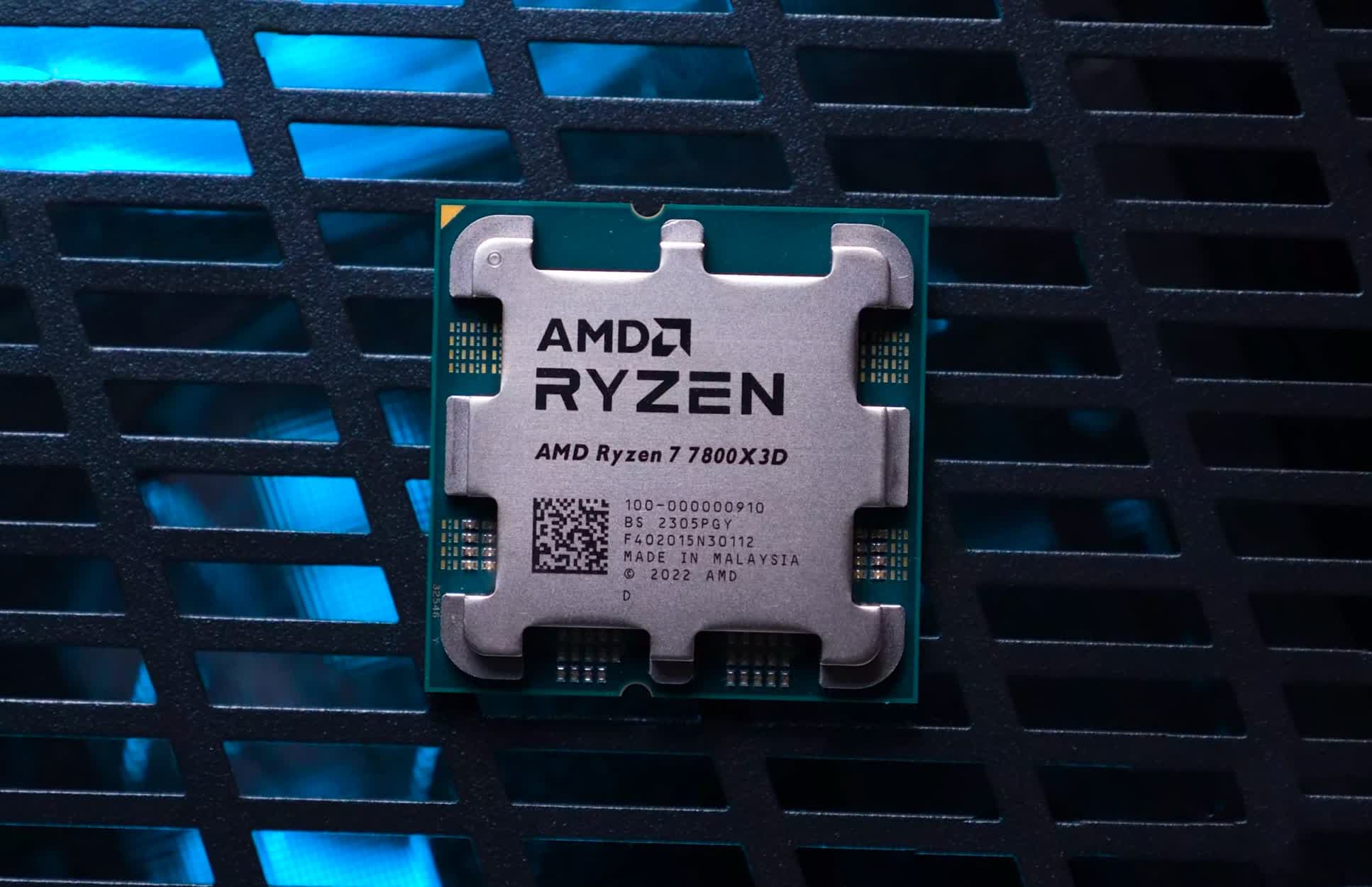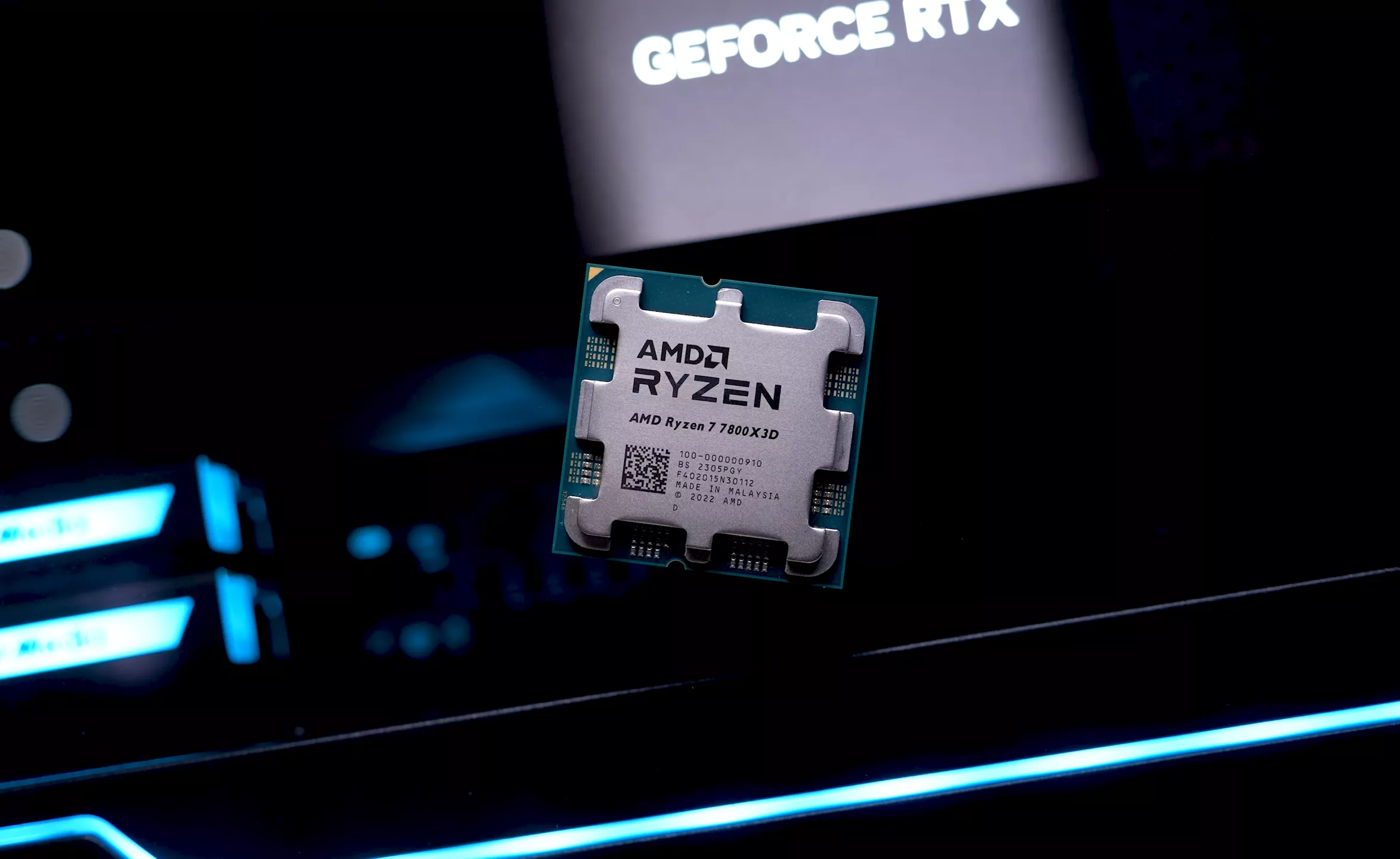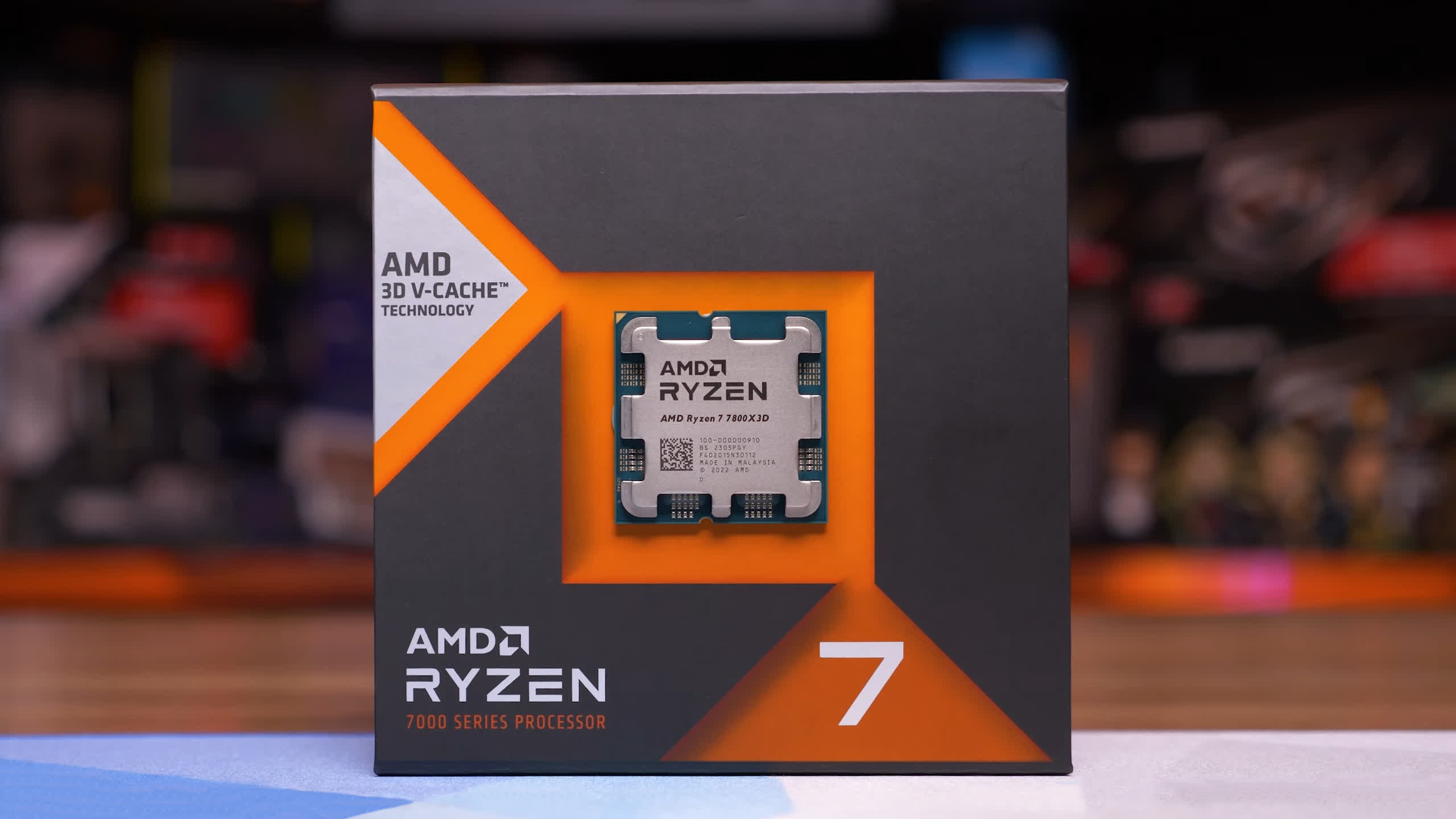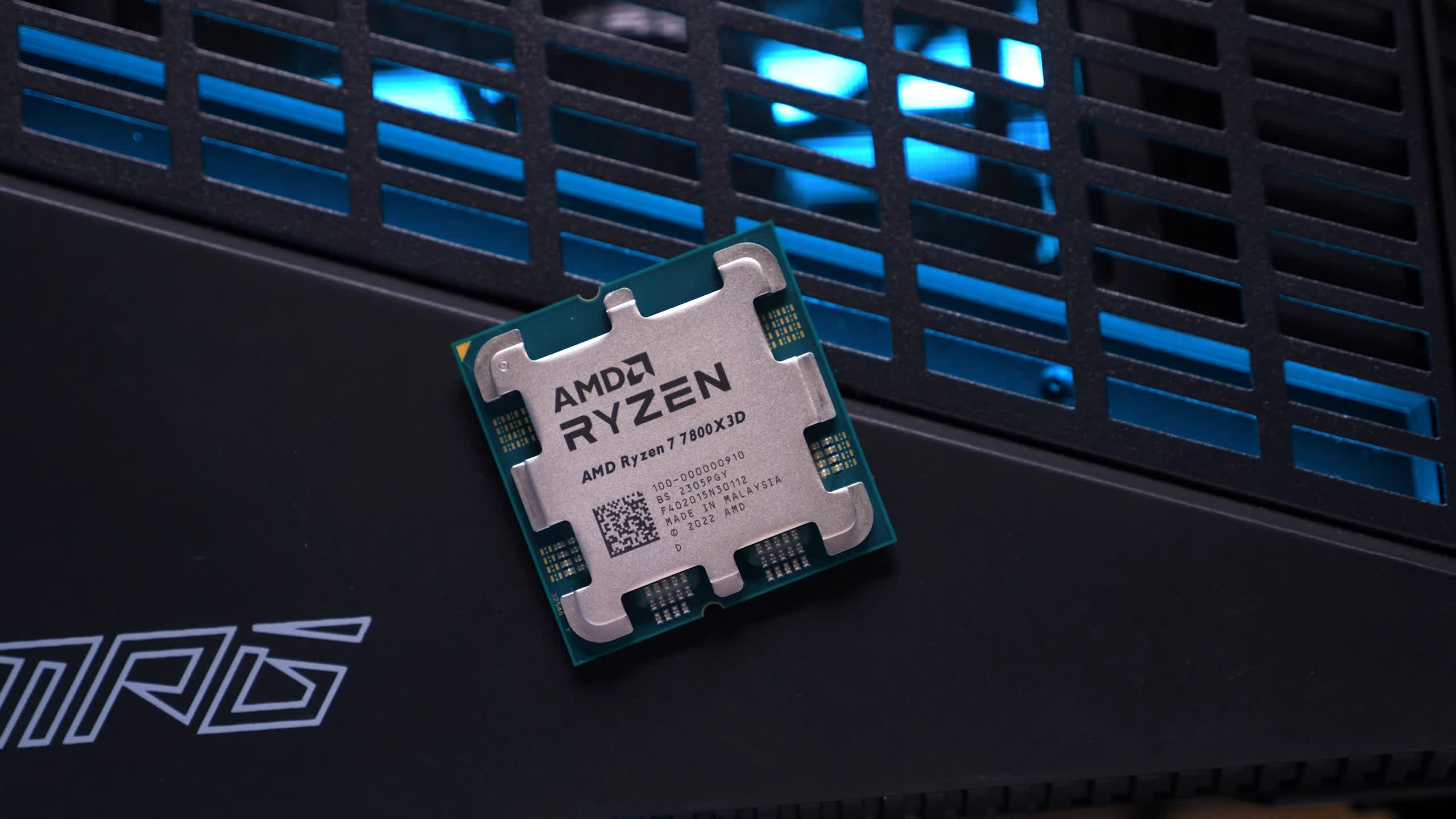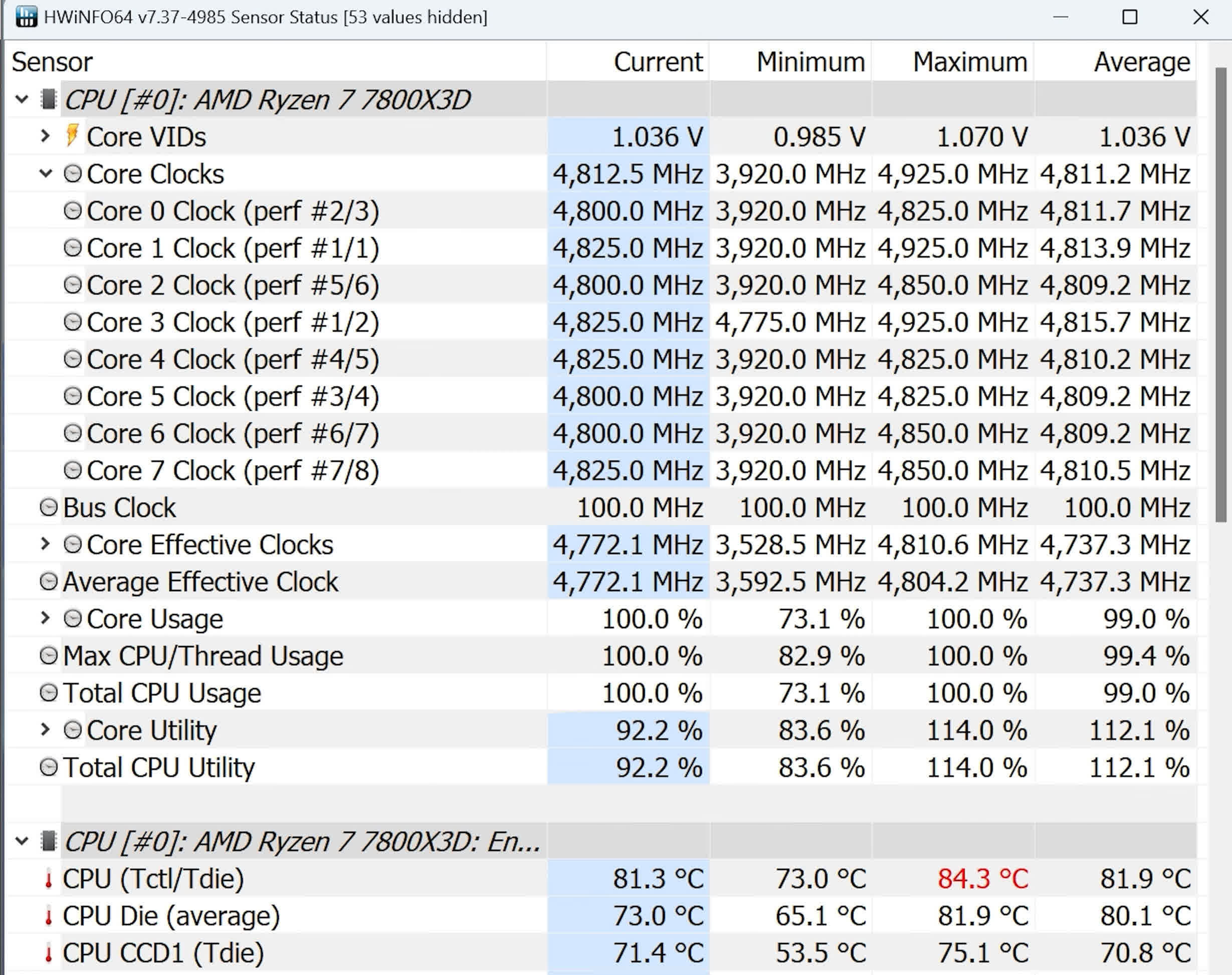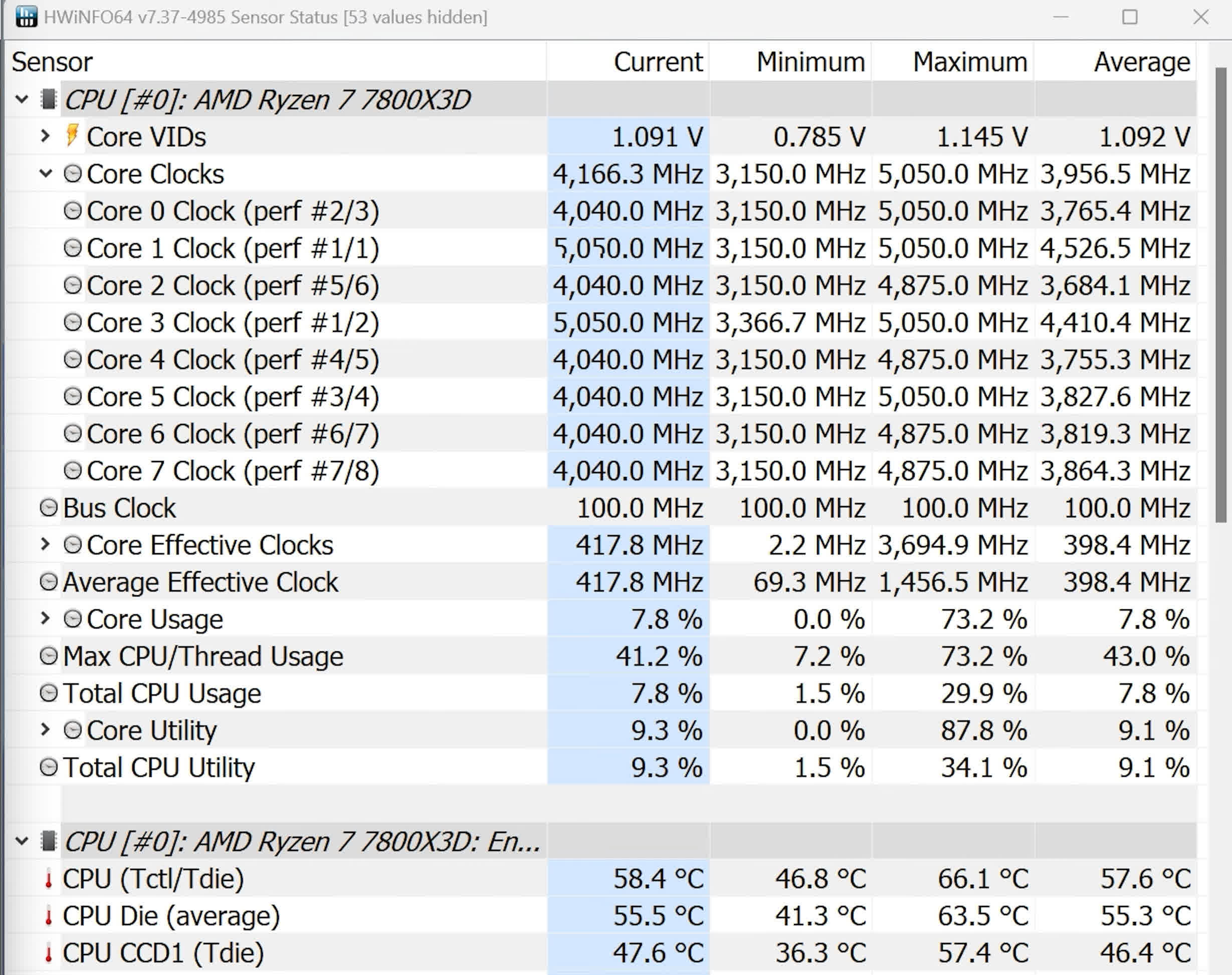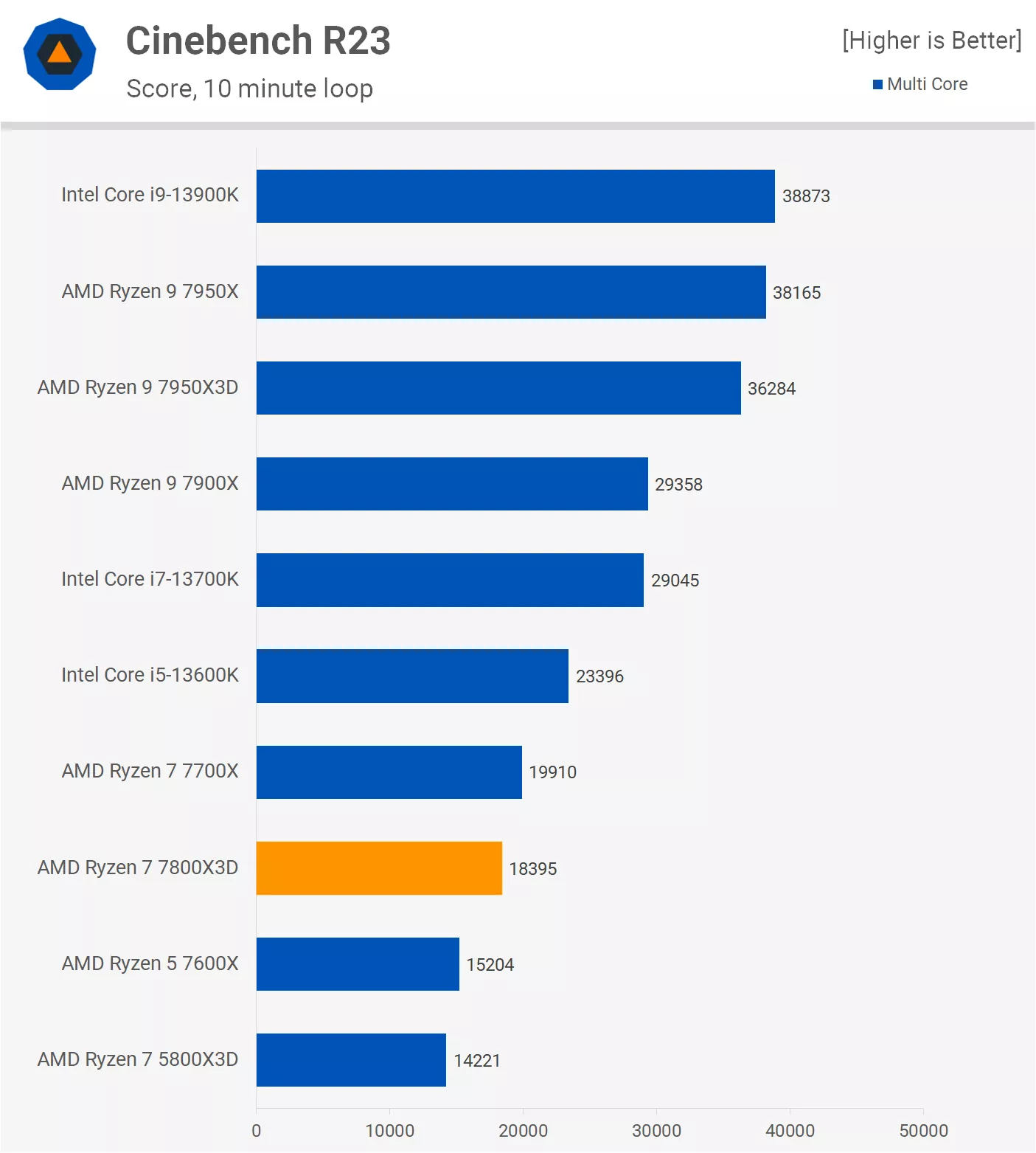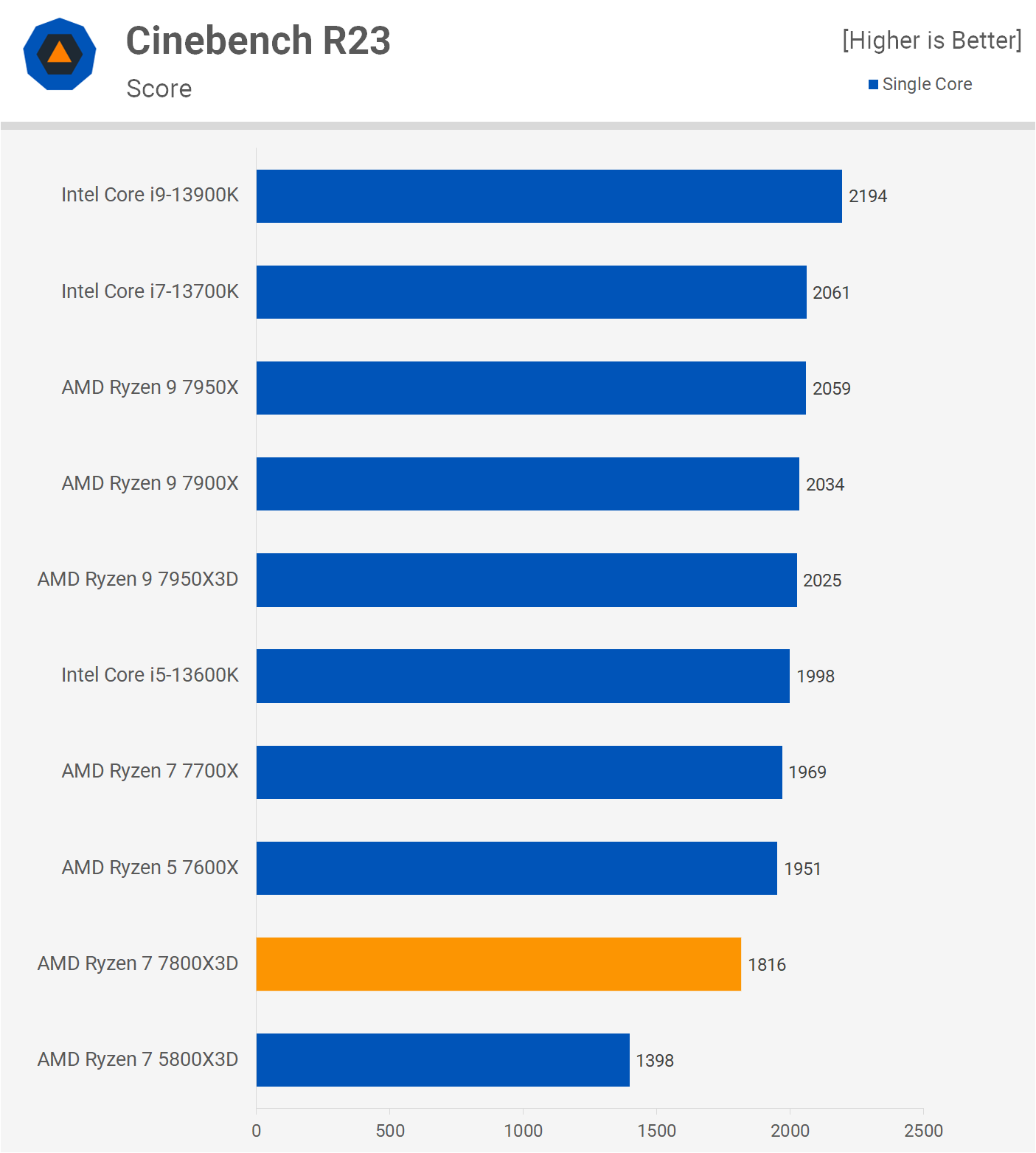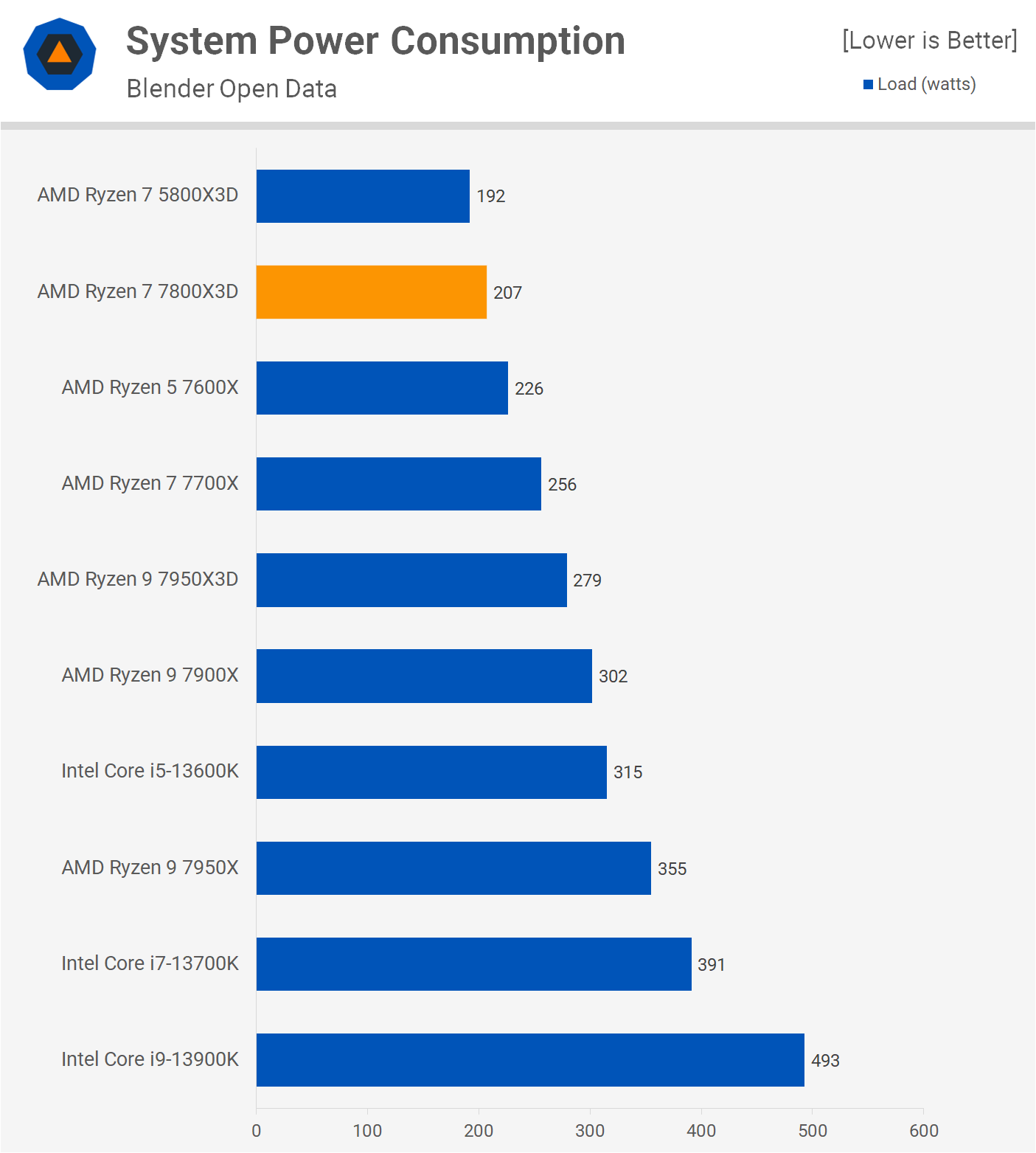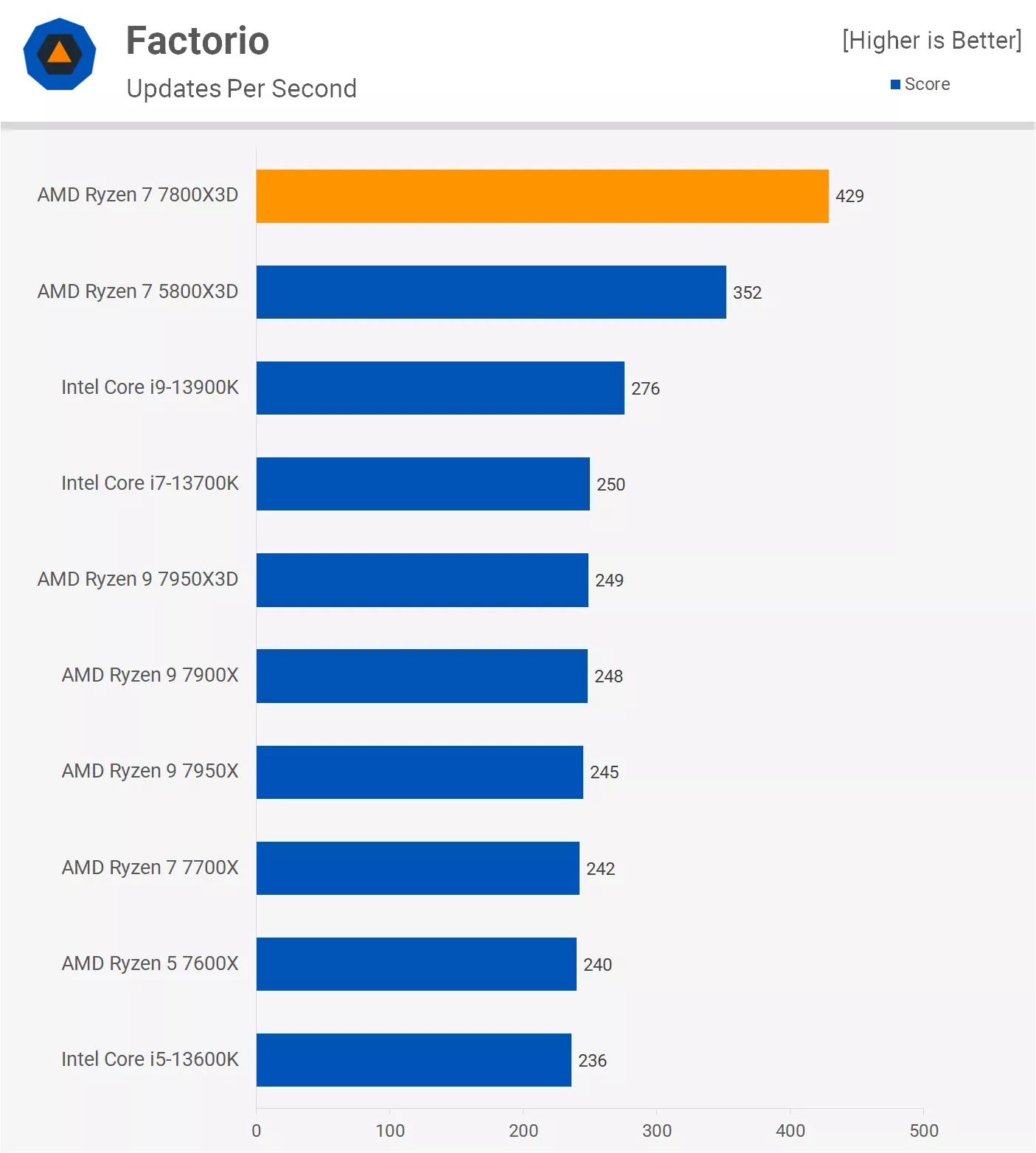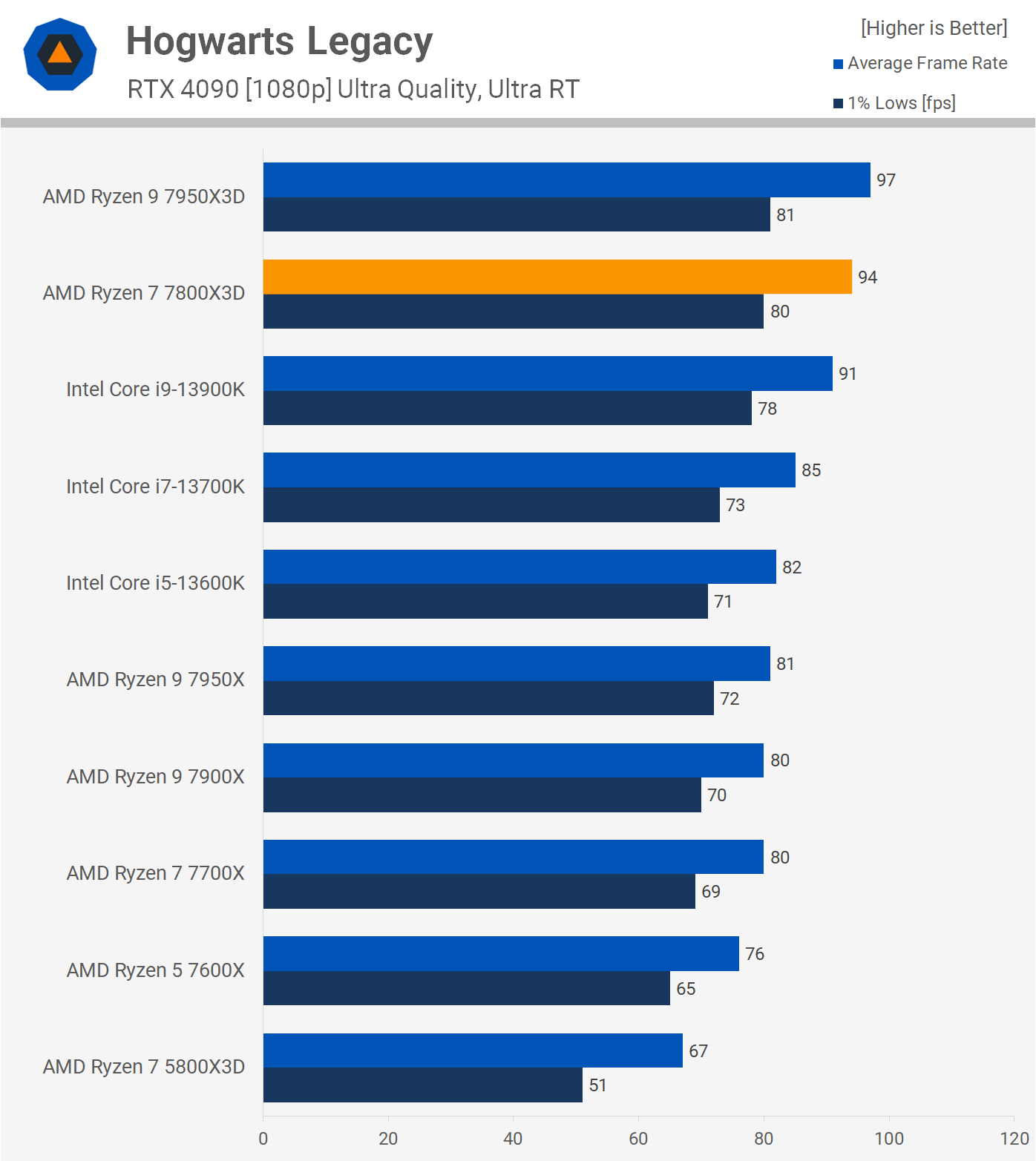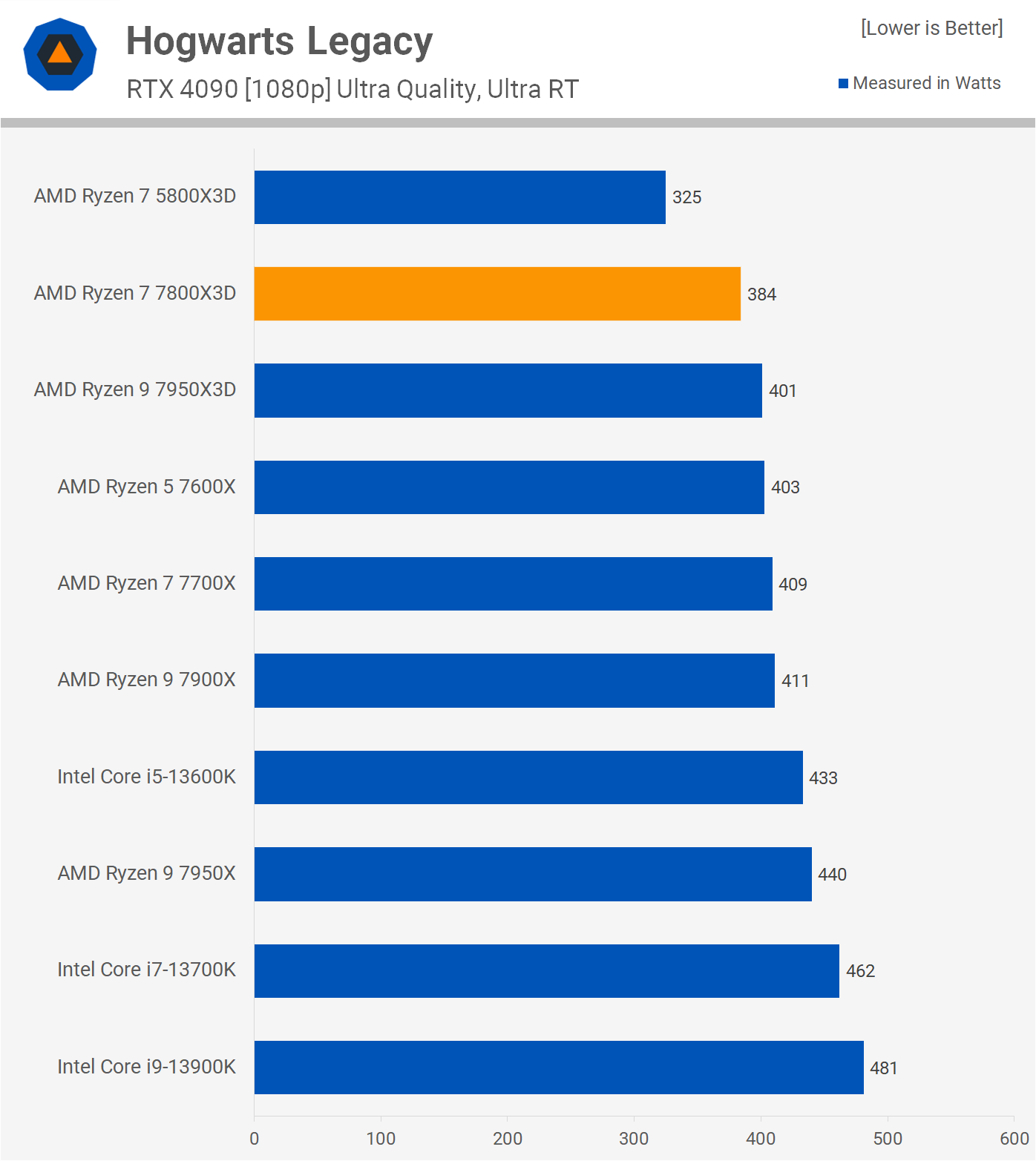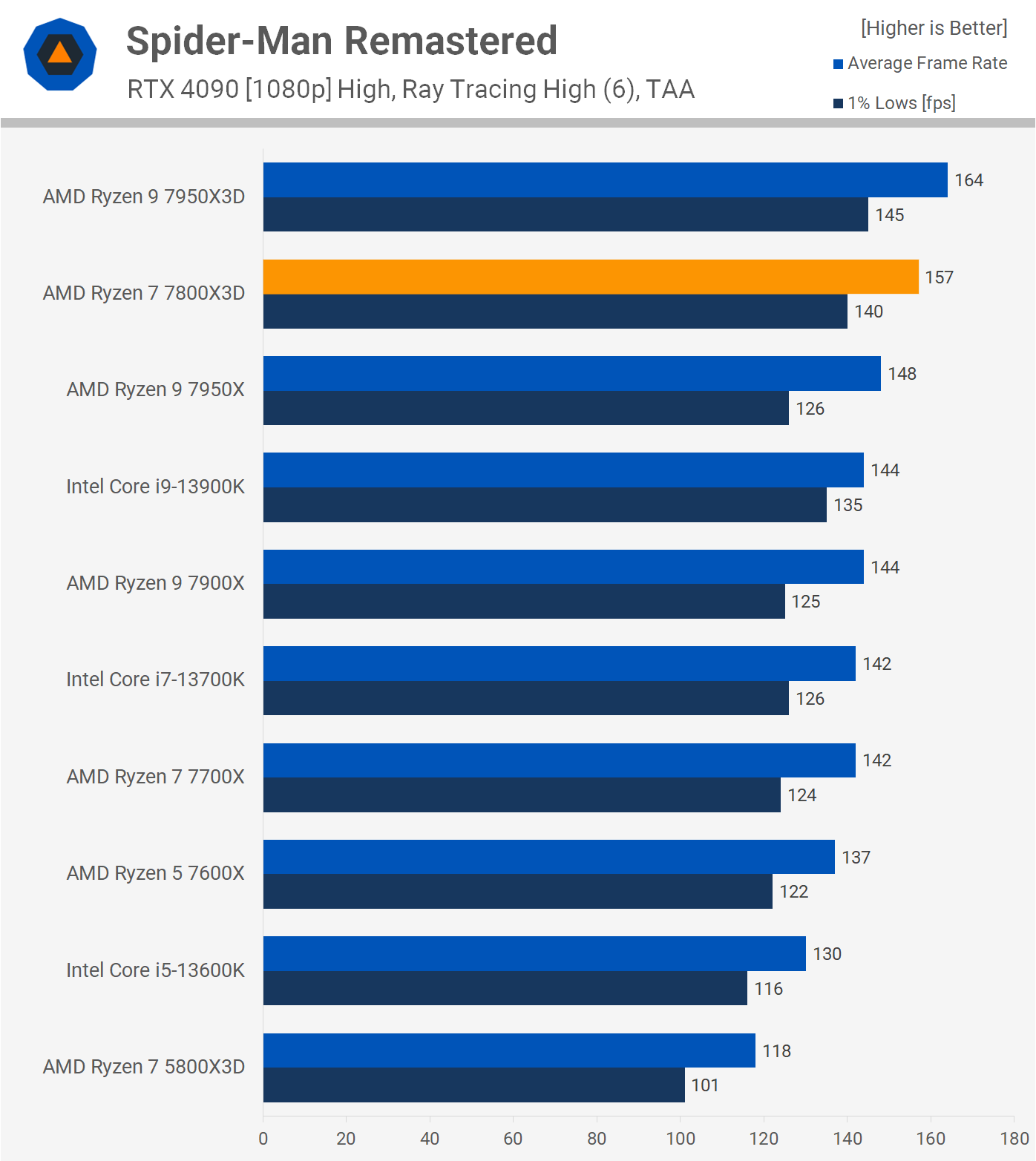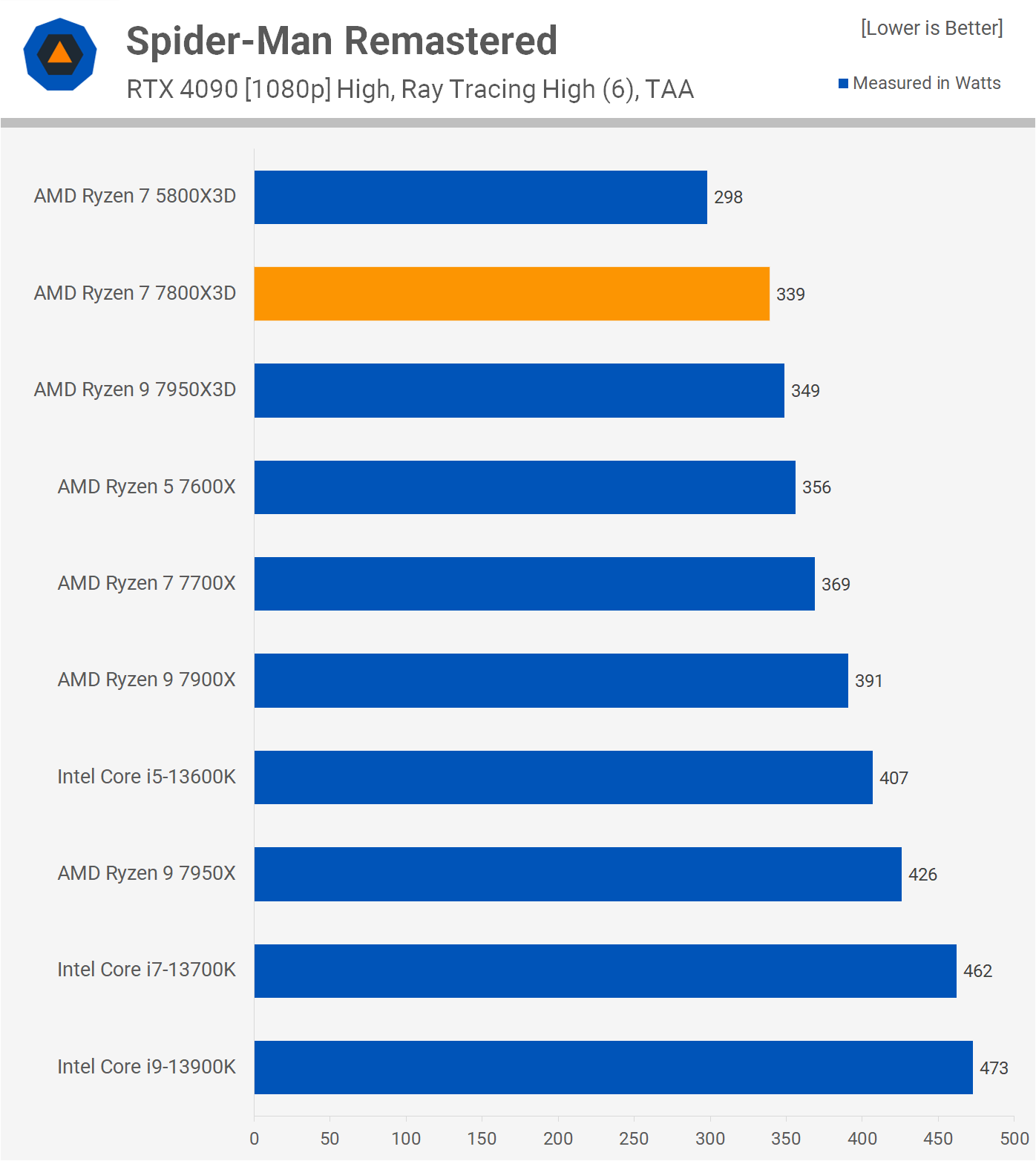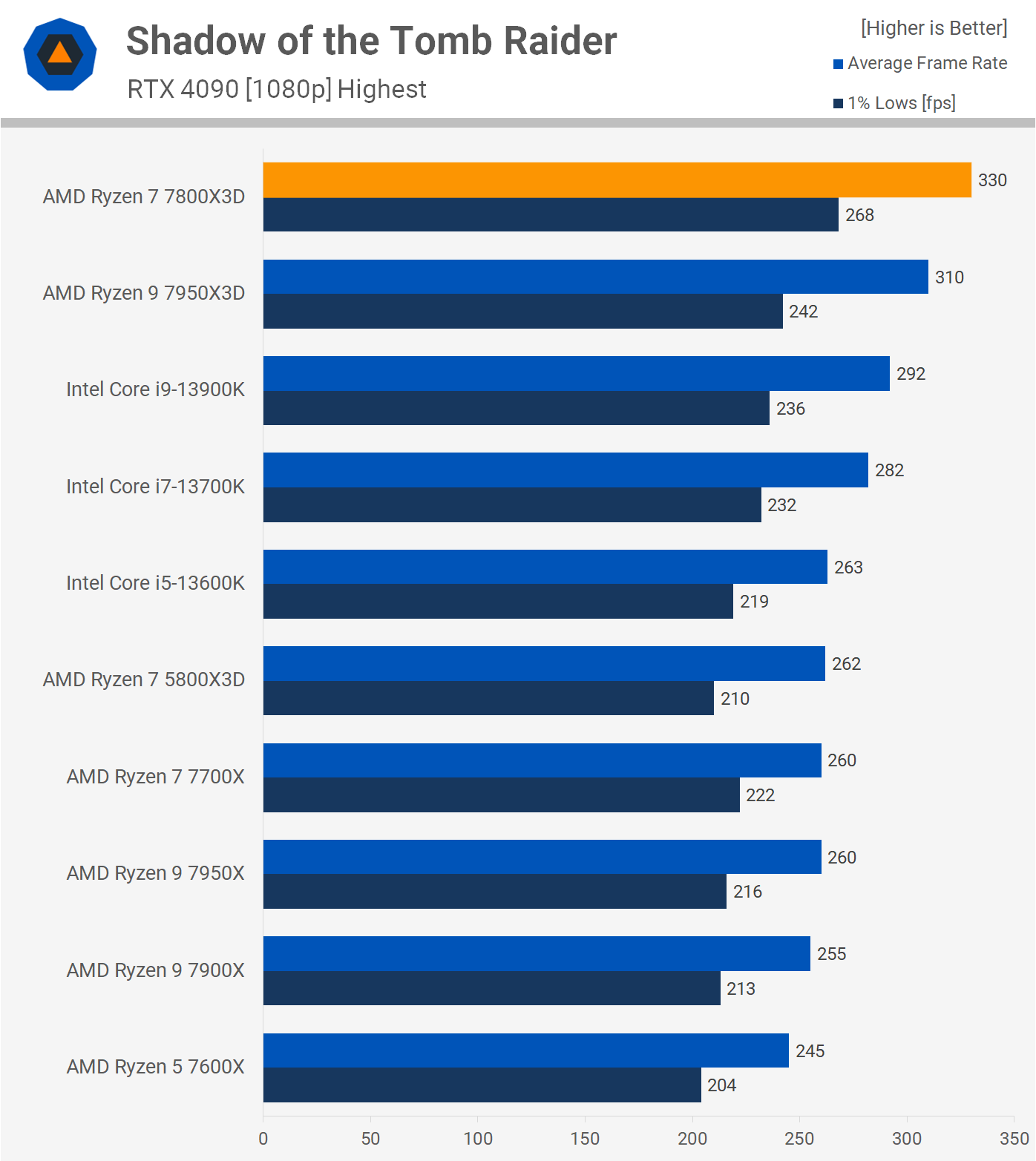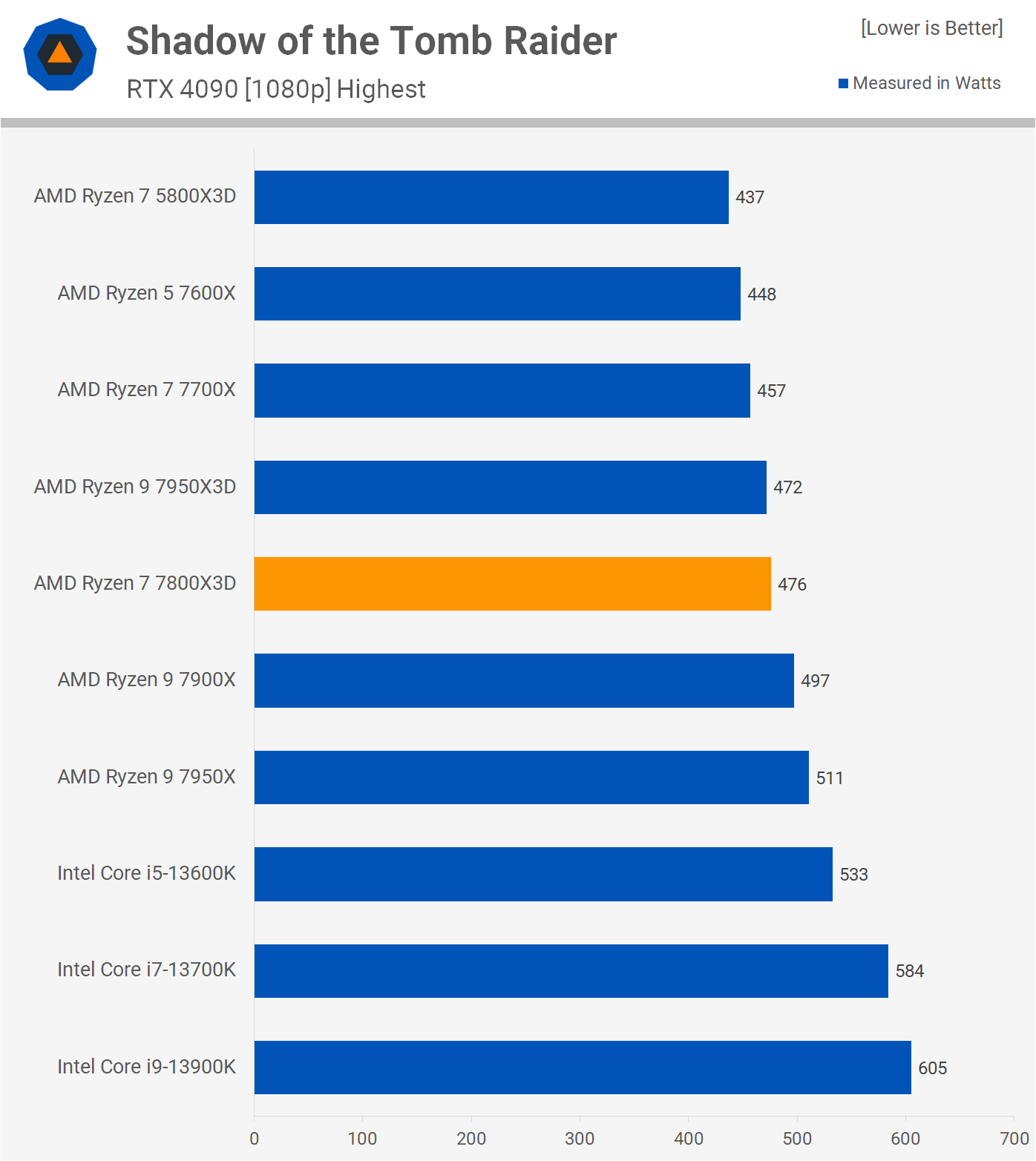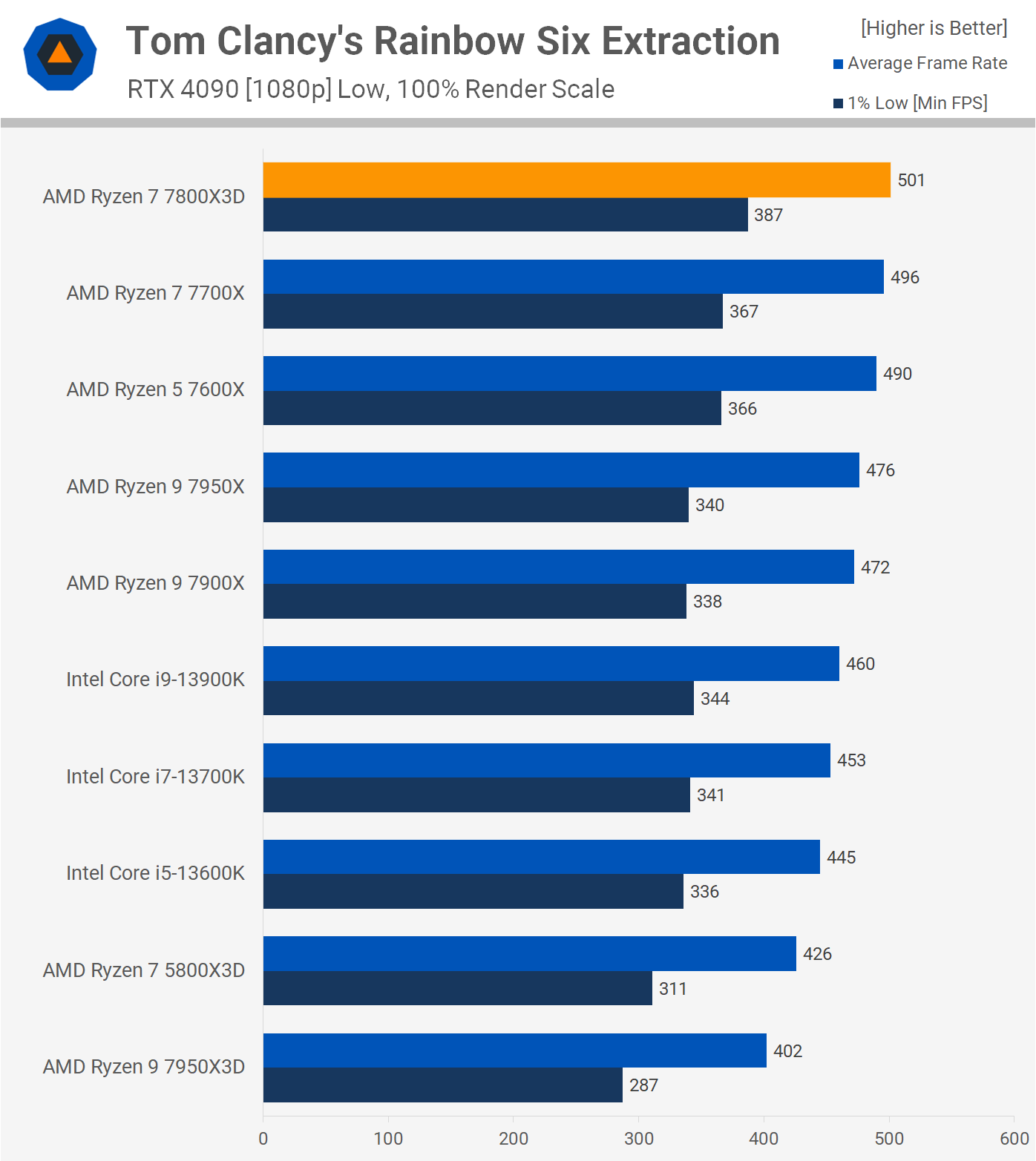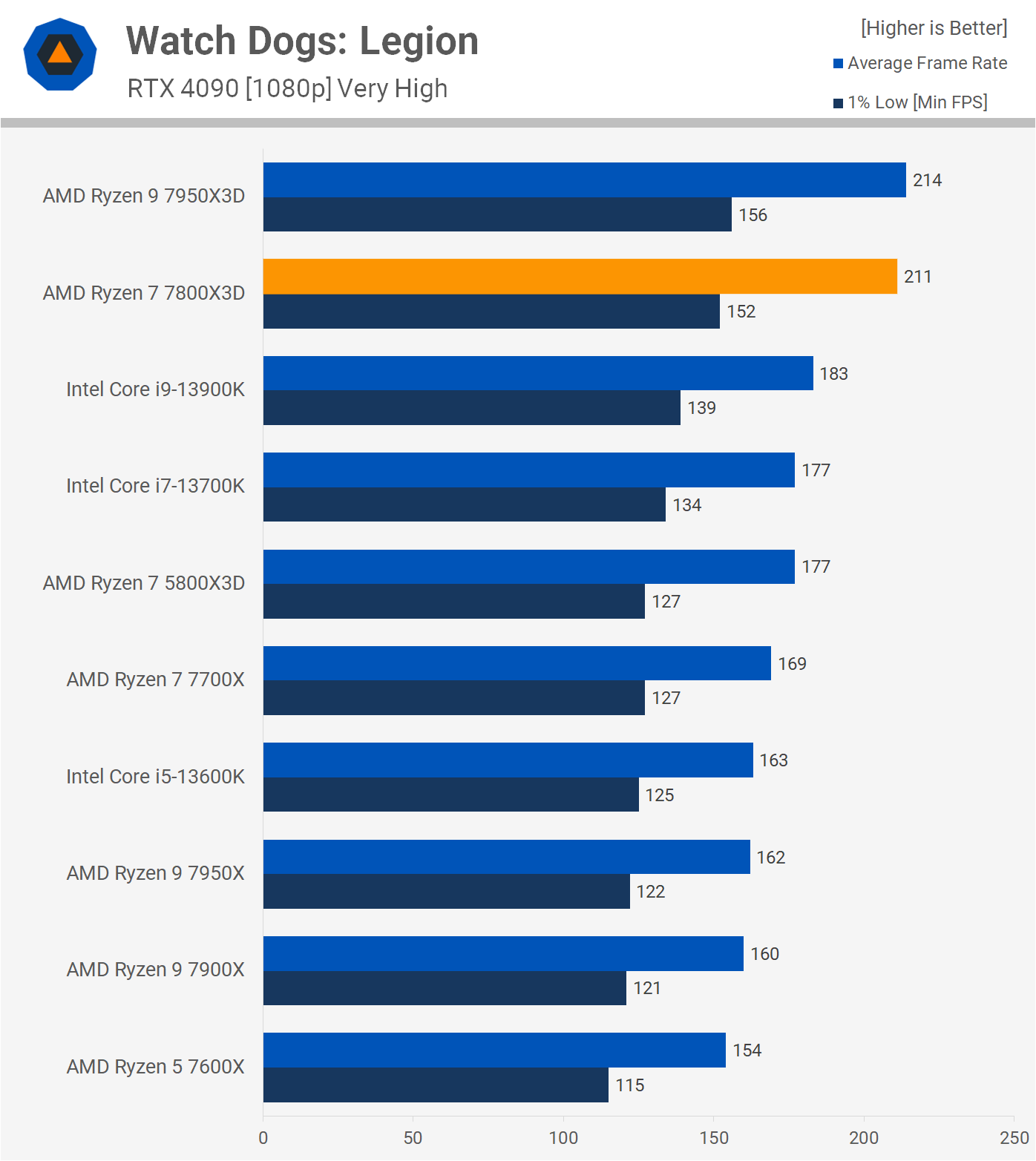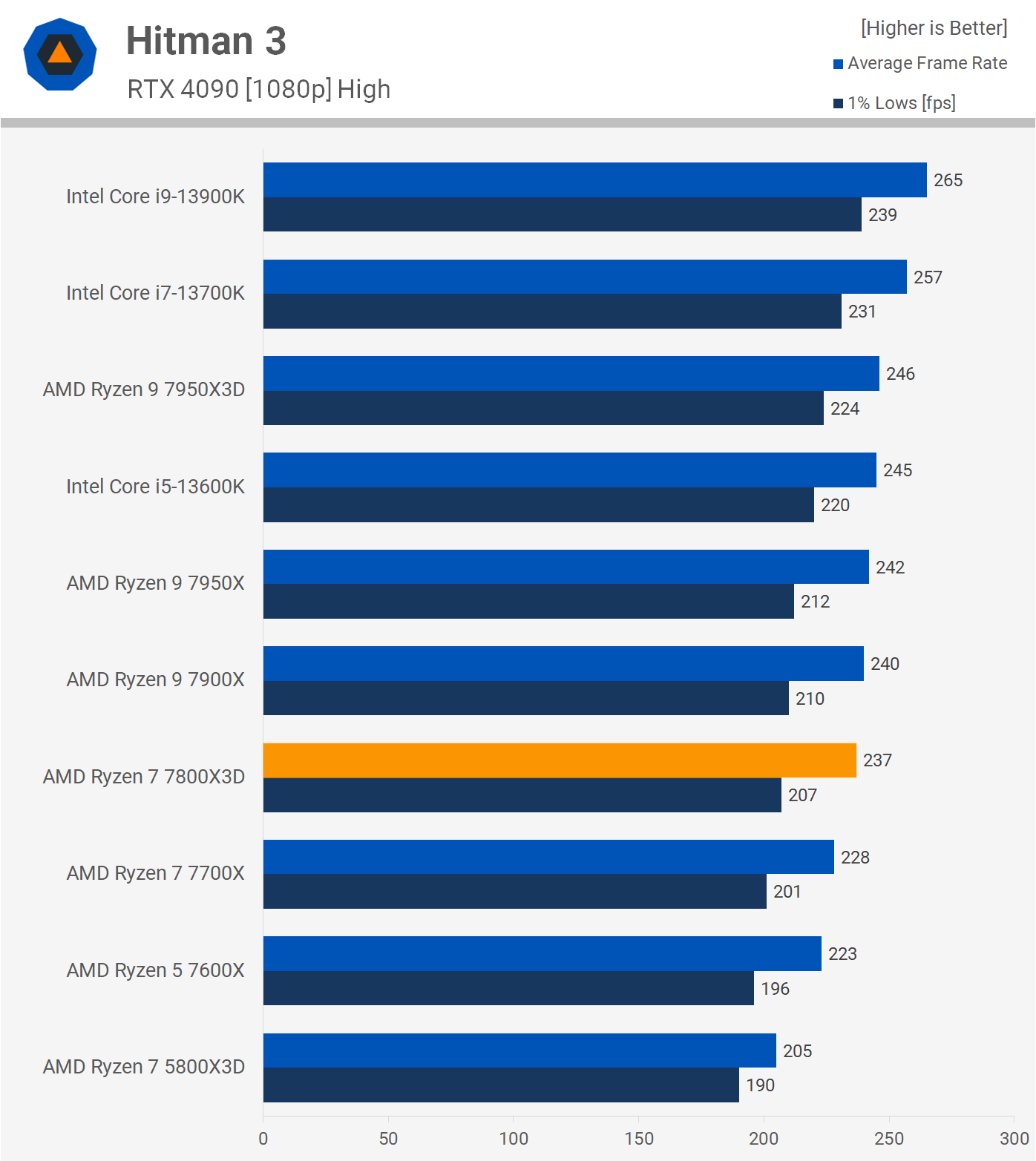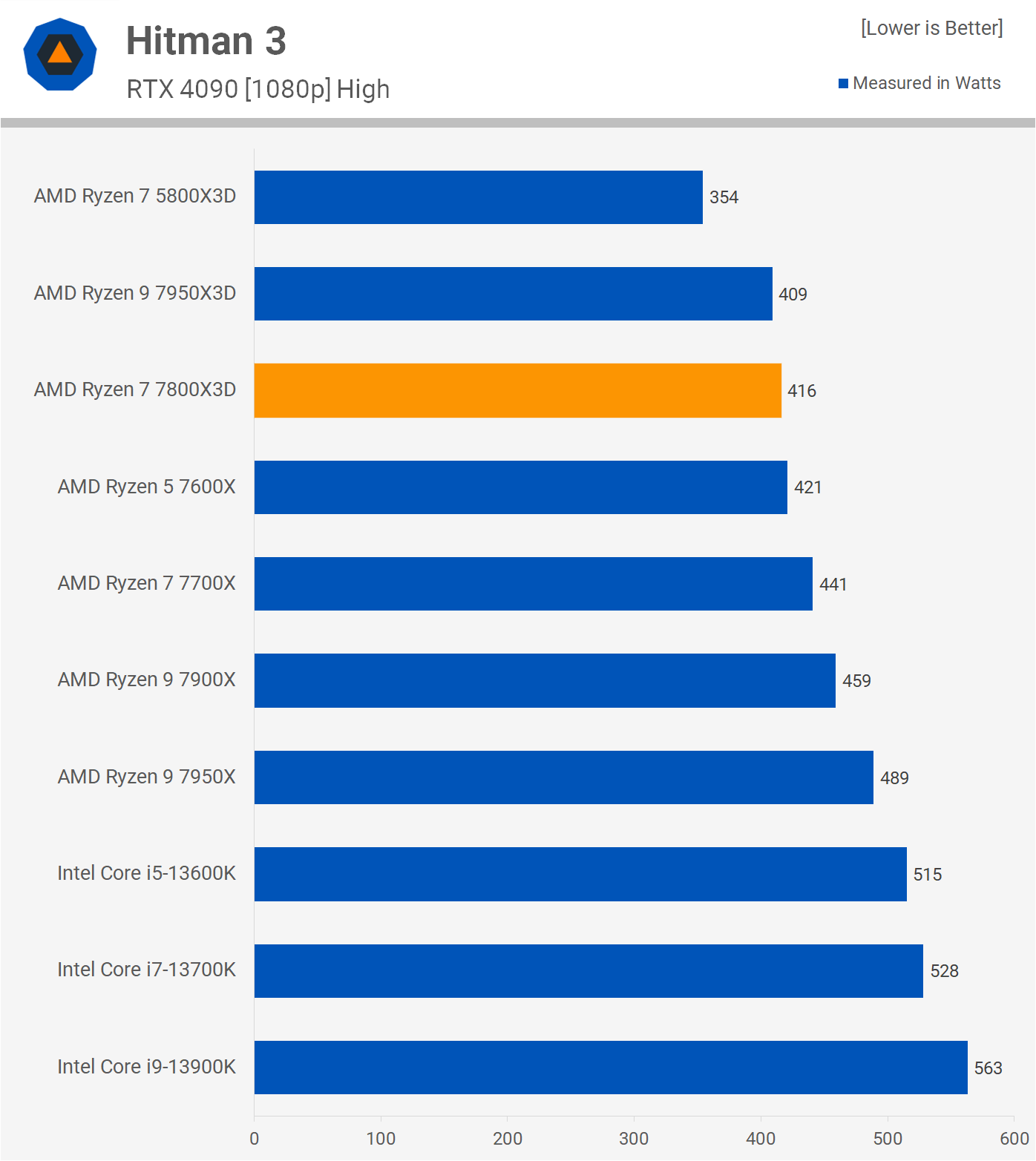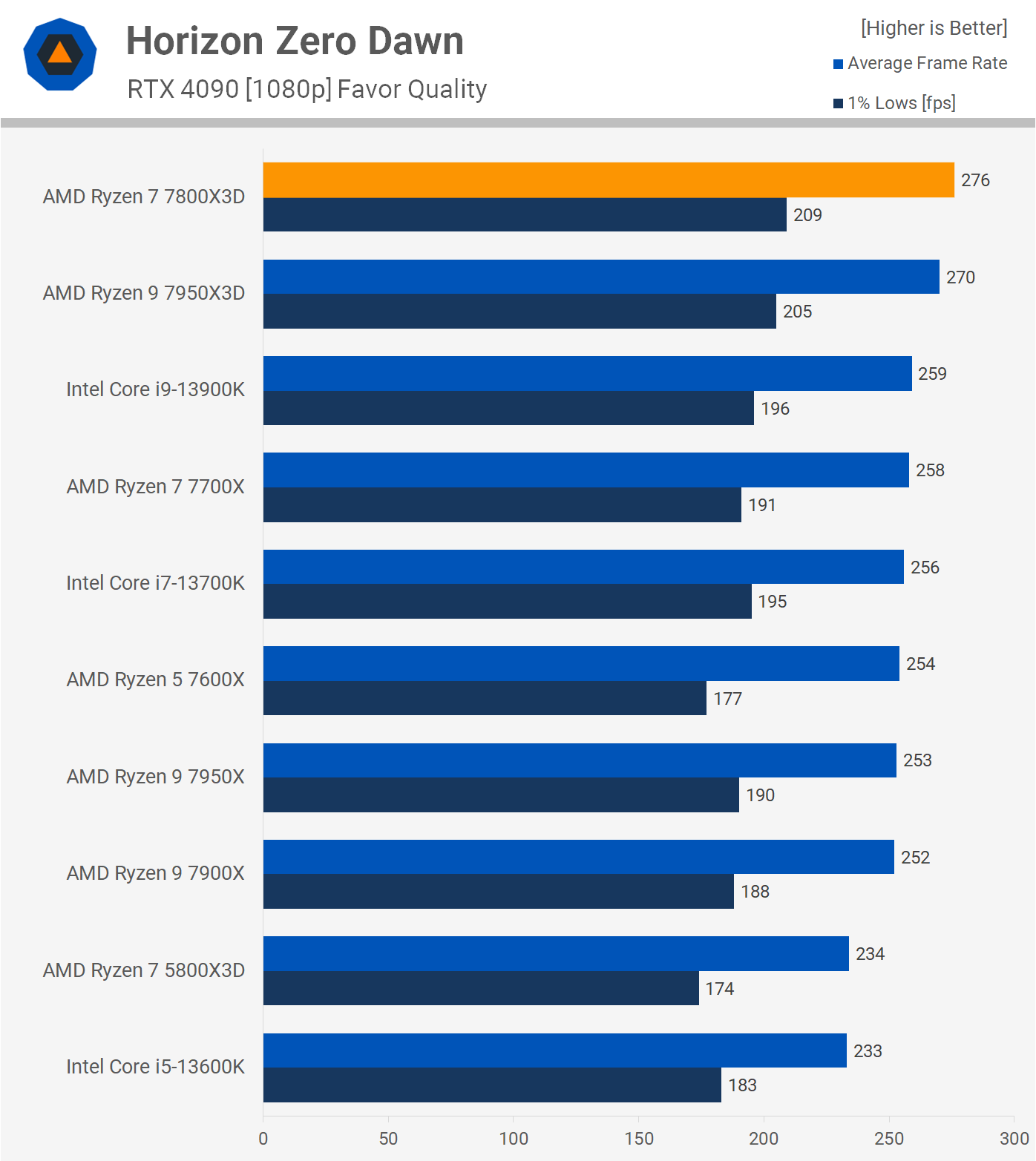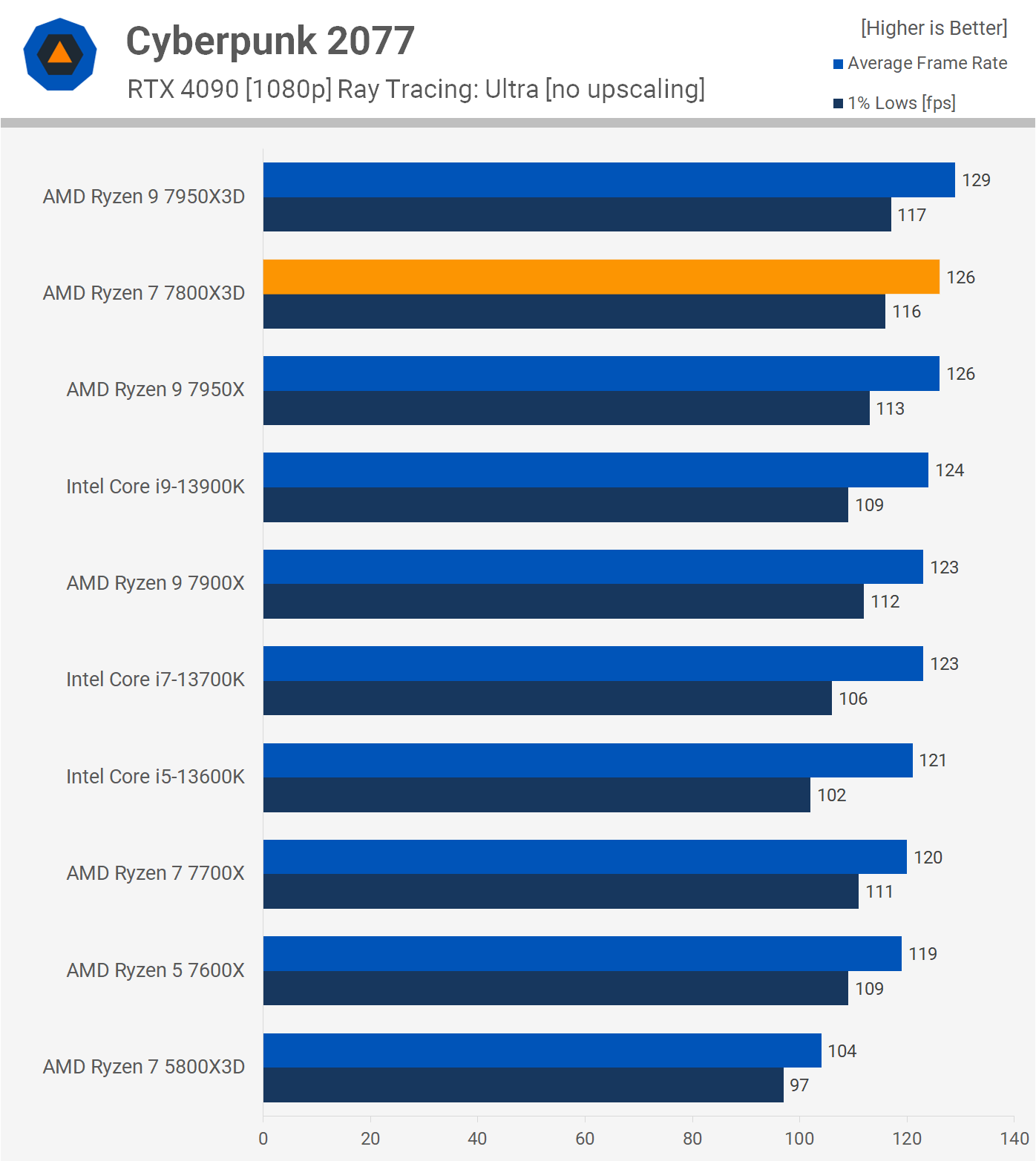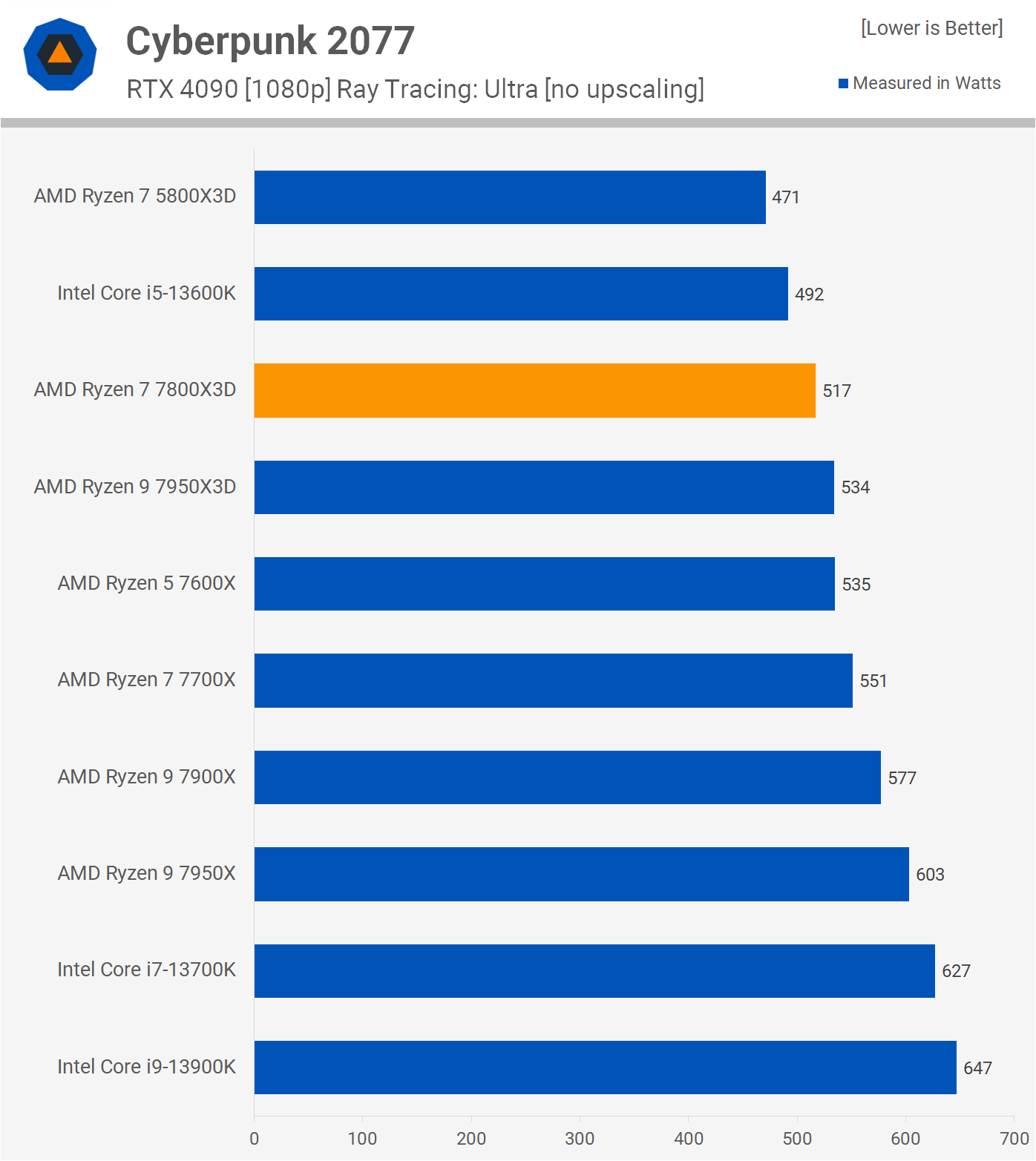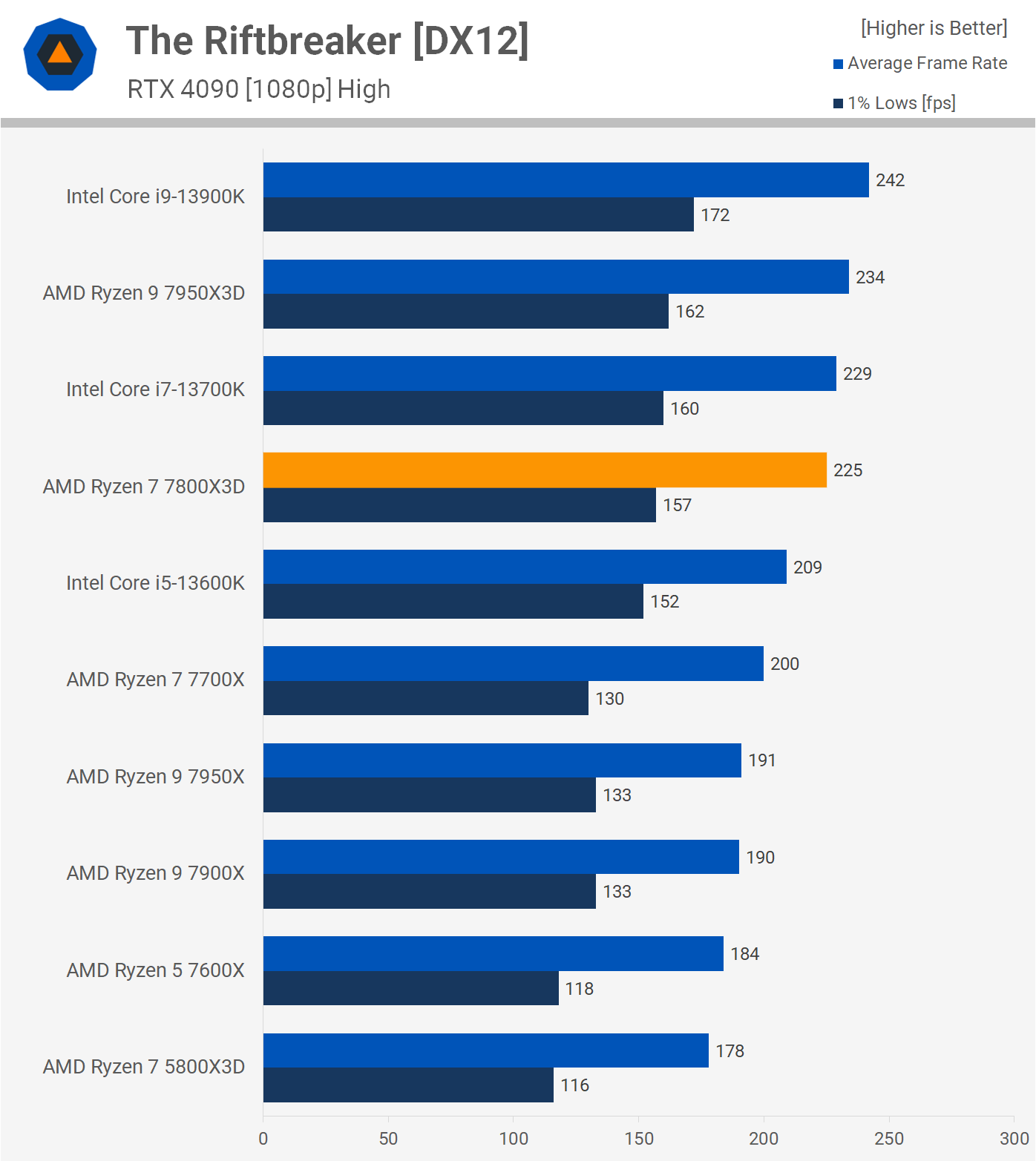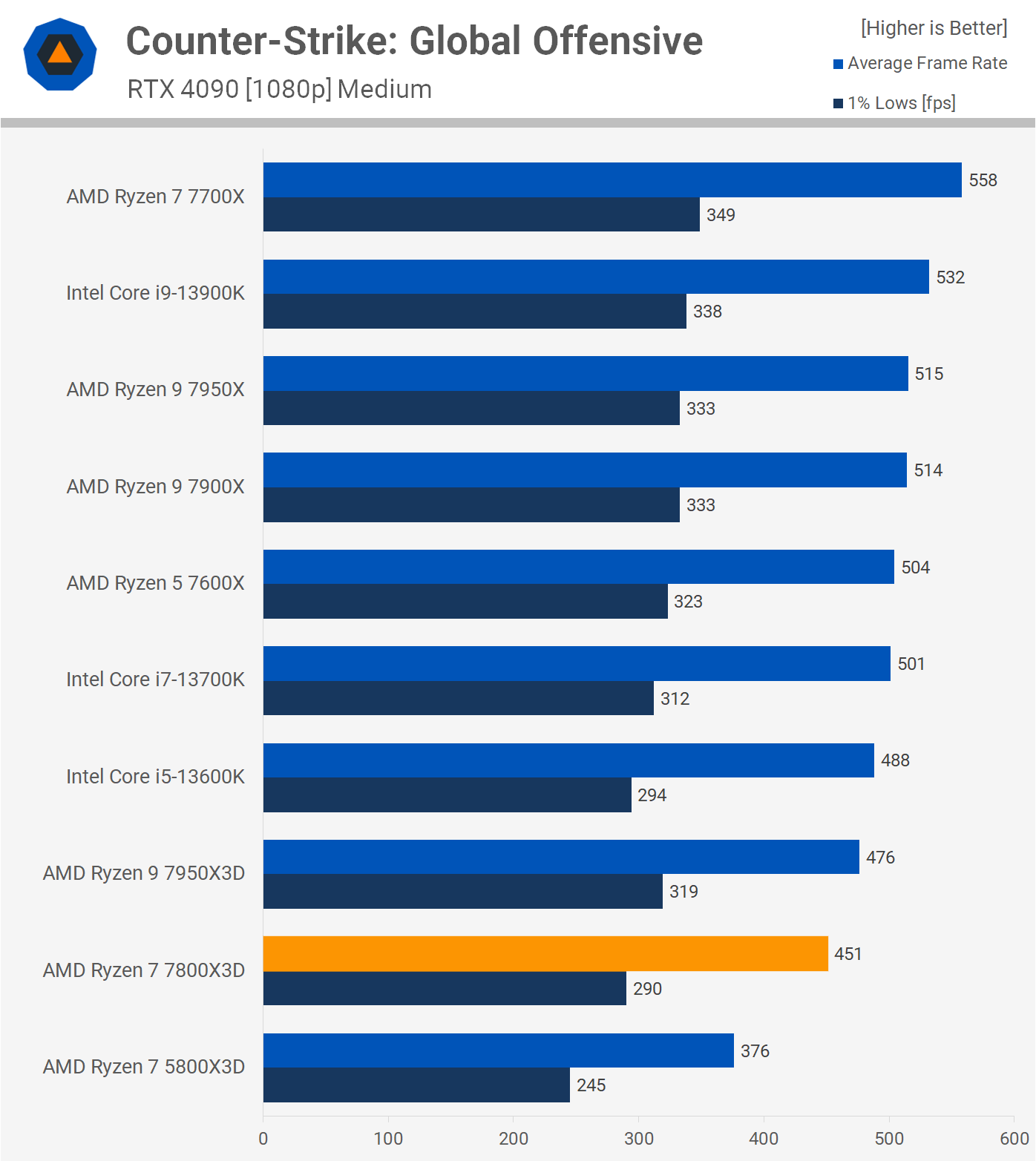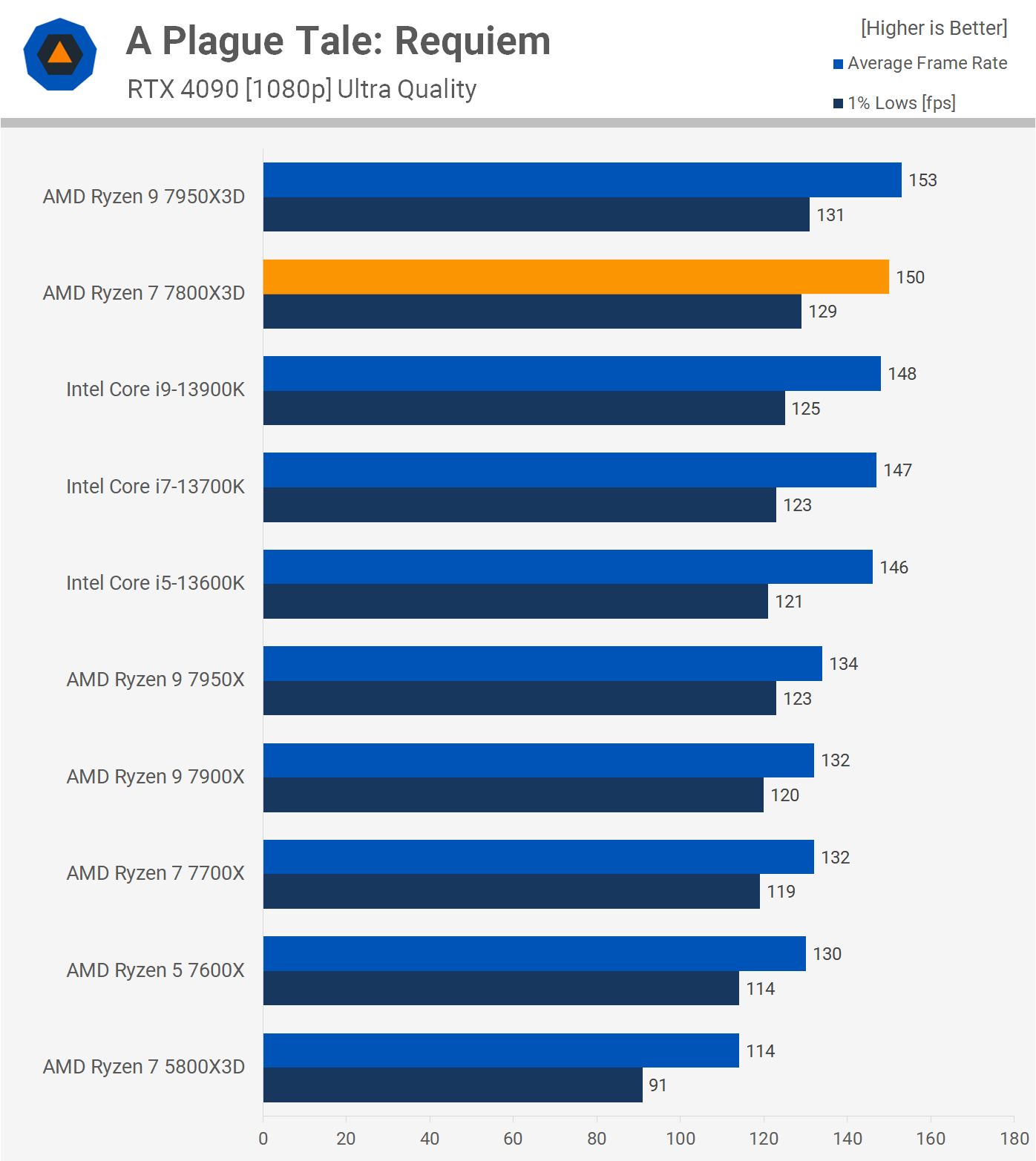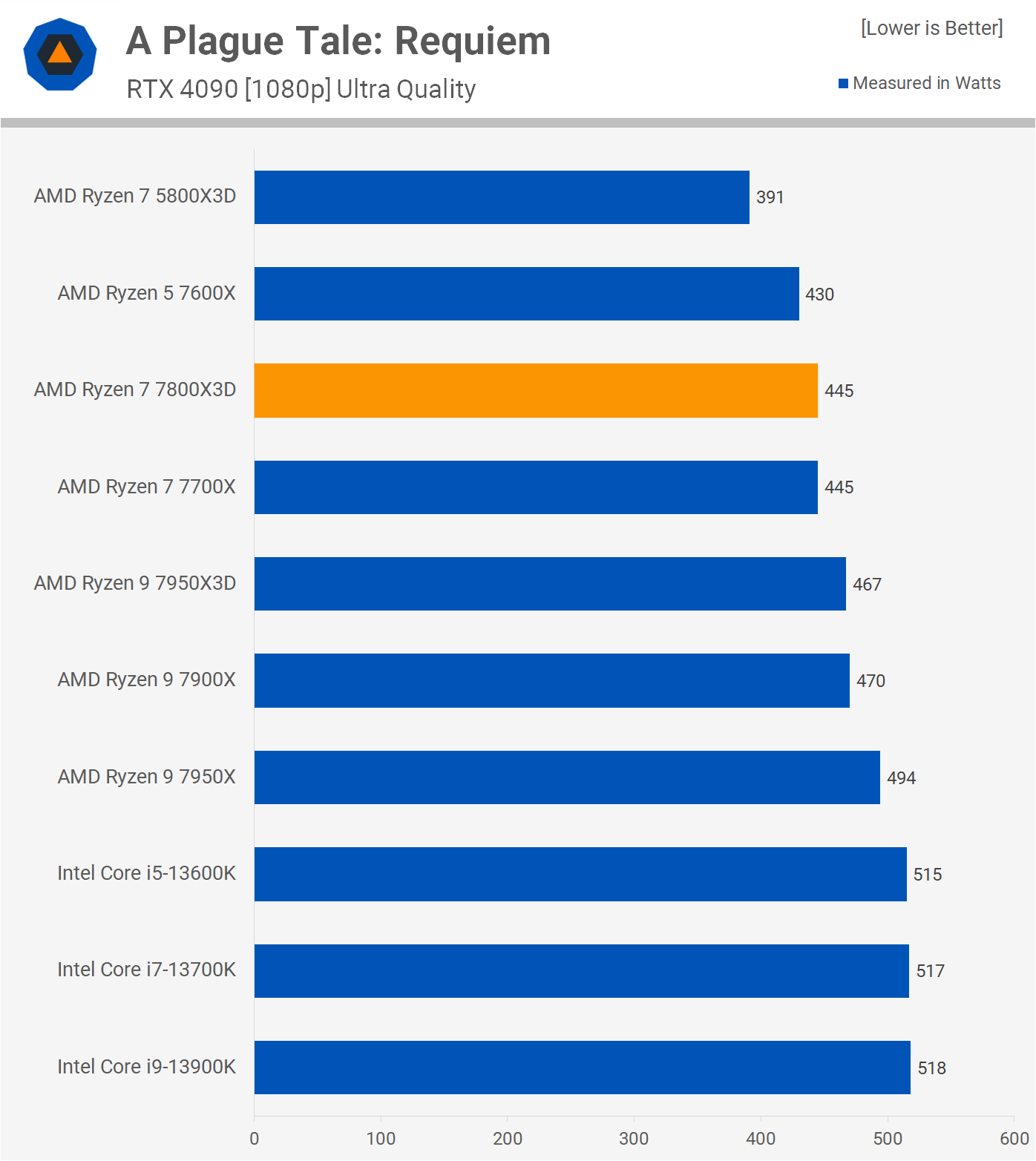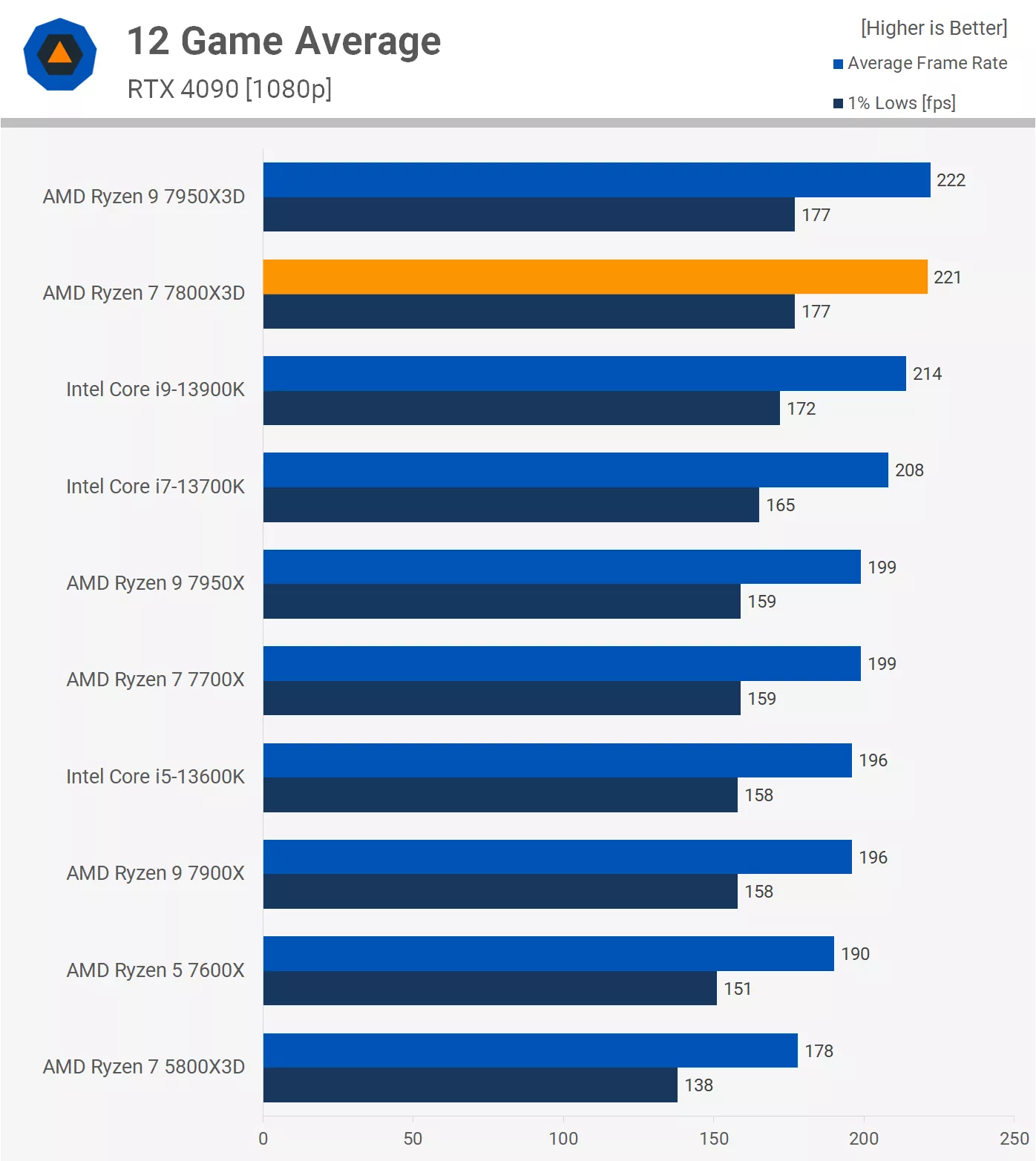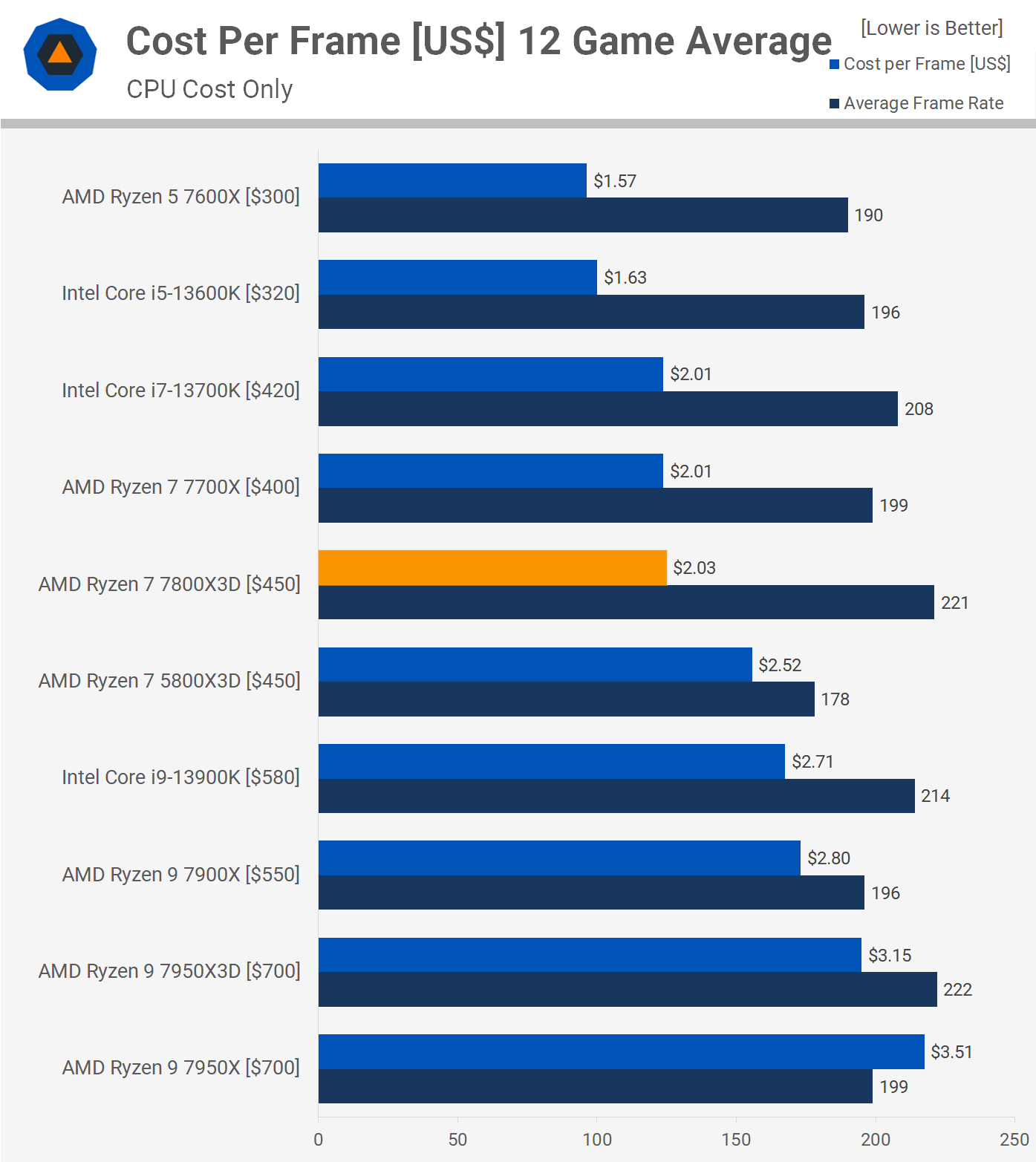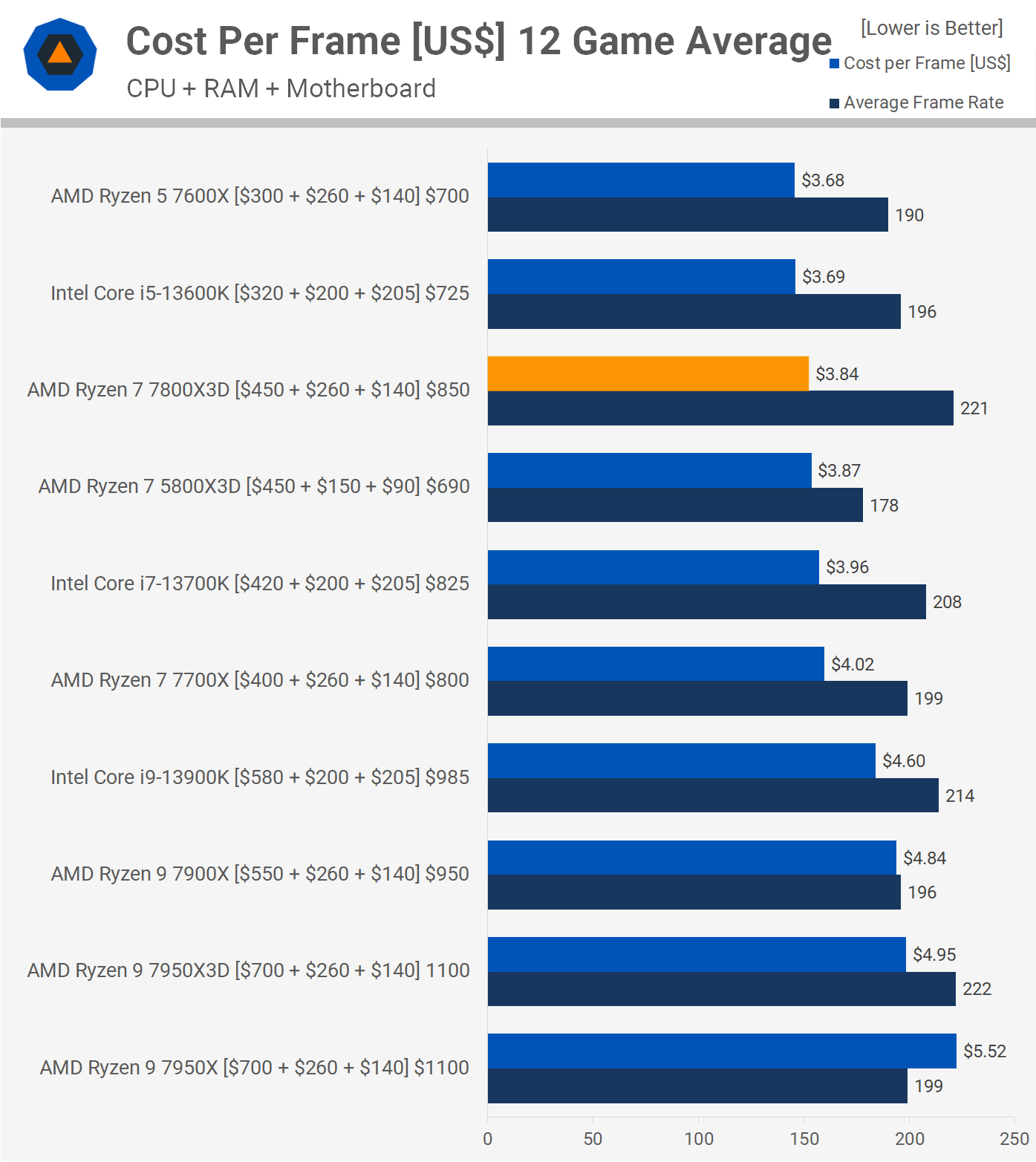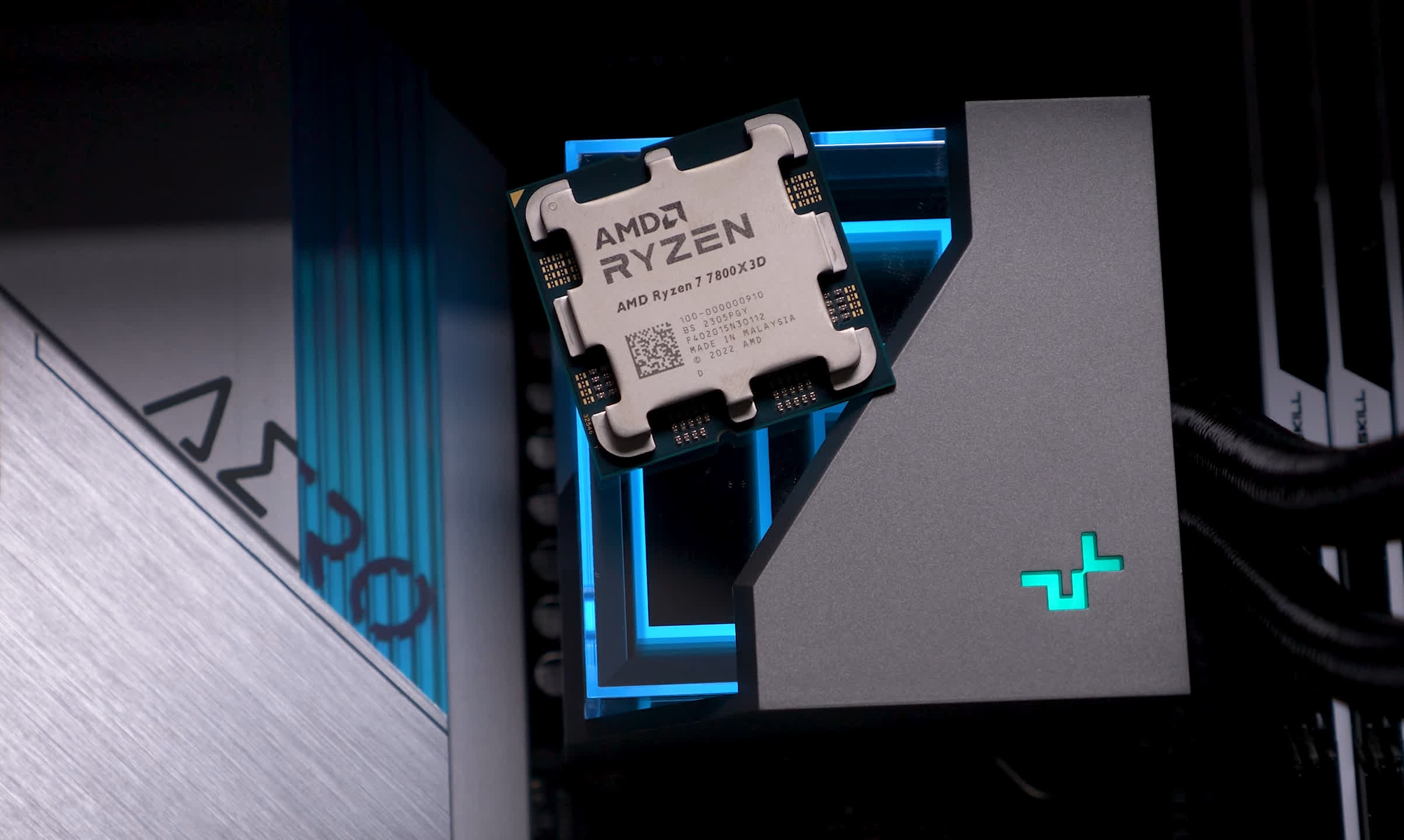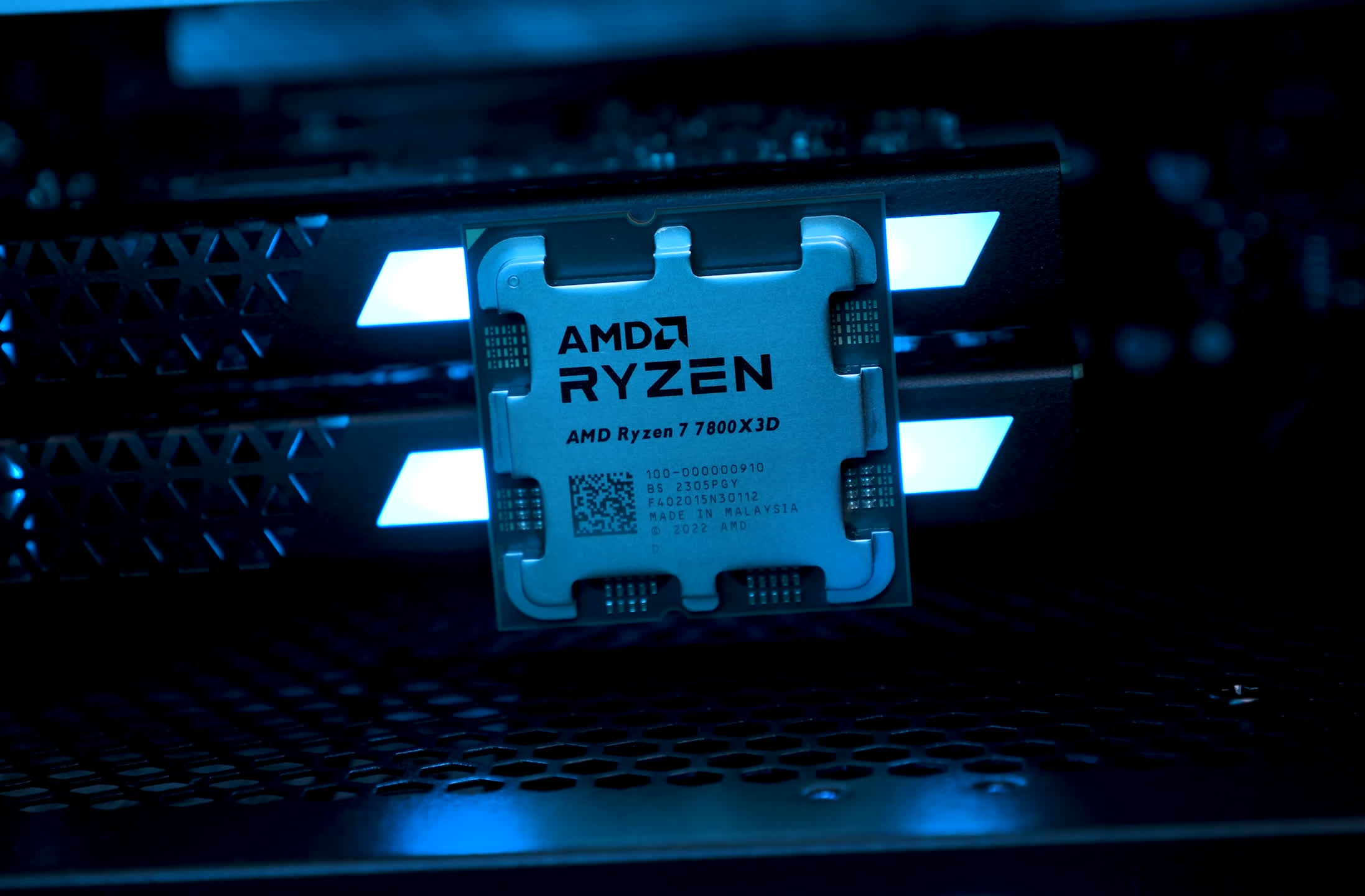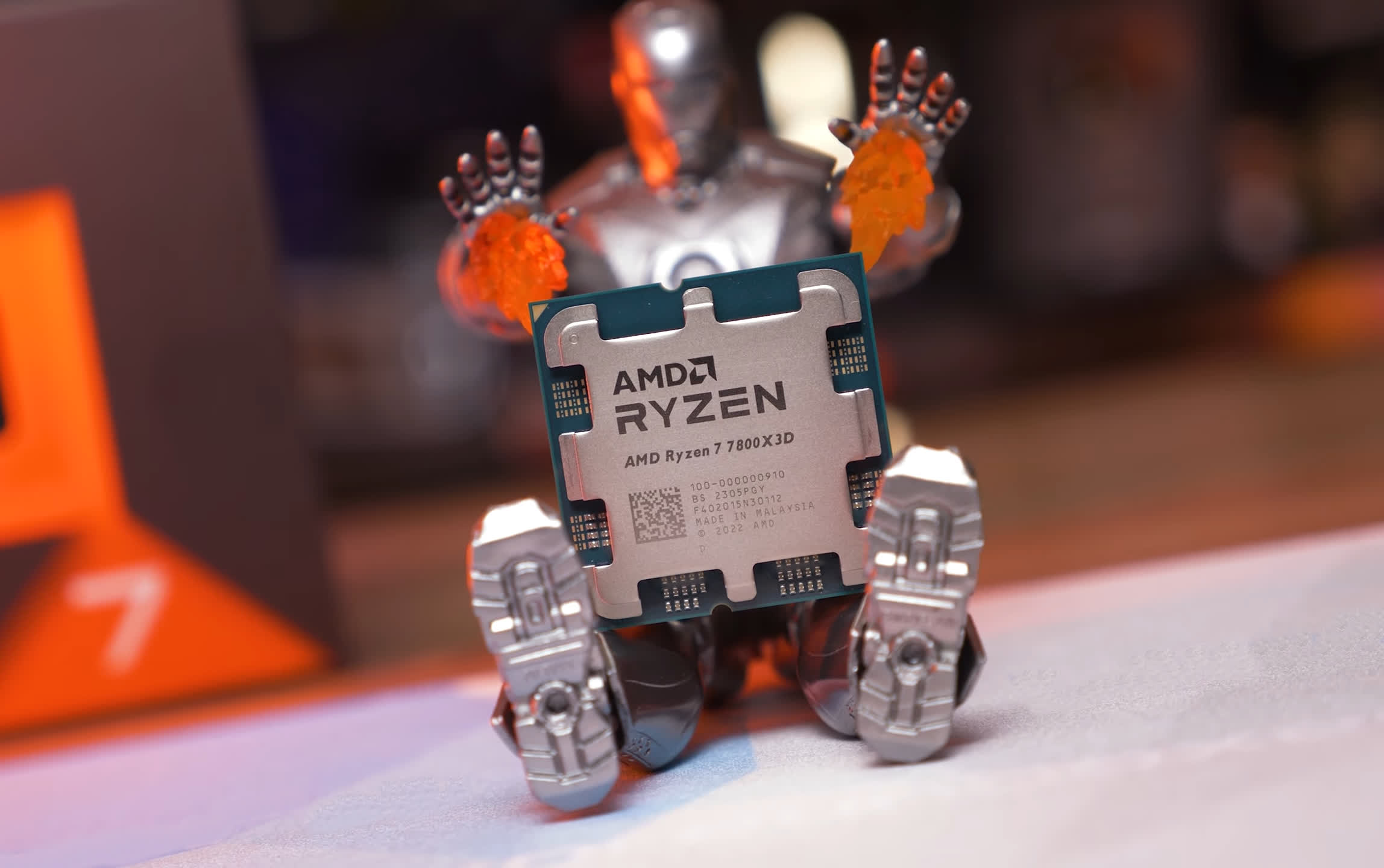Simply put, the Ryzen 7 7800X3D is the Zen 4 3D V-Cache CPU that you should all be interested in, it's fast and extremely power efficient. For some reason, AMD decided it would be a good idea to delay the release of this model, and lead instead with the 7950X3D and 7900X3D, both of which arrived about a month ago.
The Ryzen 9 7950X3D is by no means a bad product, but it is a niche CPU that doesn't make sense from a pure gaming standpoint. With just one of the two CCD's armed with 3D V-Cache, the 16-core 7950X3D is heavily dependent on Windows addressing the correct core complex die, and that doesn't always happen.
Therefore, to ensure maximum performance, gamers are best off disabling the second CCD in the BIOS, essentially turning the 7950X3D into the 7800X3D, while paying $700 for the privilege. Thankfully the 7800X3D is here now, so rather than overpaying for the 7950X3D, you can now buy the 7800X3D for $450, which is a much more interesting prospect for gamers.
At that price, the 7800X3D is just $50 more than the 7700X, but also $120 more than the non-X version, the plain Ryzen 7 7700. It's also priced to compete with the Core i7-13700K, which can currently be had for $420, while the 13900K is up around $580.
For this review we've had to update all of our already very fresh data. This is because Nvidia recently changed the way their GeForce drivers behave by disabling Resizable BAR in games such as Horizon Zero Dawn and we believe Spider Man-Remastered as well, resulting in performance gains in those games. There were also a few smaller performance changes so we simply decided to re-test everything, including AM4 and AM5 processors.
Along with updating the RTX 4090 with the latest GeForce drivers, we've also updated all the motherboards BIOS revisions and we've moved the LGA1700 test system over to the Gigabyte Z790 Aorus Elite AX using DDR5-7200 CL34 memory. As for the AM5 test system, that's still using the Gigabyte X670E Aorus Master with DDR5-6000 CL30 memory, as that's the fastest memory speed that will work with all Zen 4 processors.
Operating Behavior
Before we jump into the benchmark graphs, here's a look at the clock behavior of the 7800X3D in the Cinebench R23 all core workload. Under this load, the CPU sustained an average clock speed of 4.8GHz and a peak operating temperature of 84c, which is very cool for a Zen 4 processor.
Then when running the single core test, we saw a sustained frequency of 5 GHz, so just a 200 MHz increase over the all core. The peak operating temperature also dropped to 66c.
Benchmarks
When running the all-core workload in Cinebench R23, the 7800X3D is 8% slower than the 7700X and a massive 21% slower than the 13600K and 37% slower than the 13700K. So in terms of value, this will be a poor offering for productivity and at this price point you'd certainly be better off with the Core i7-13700K.
The biggest drawback of 3D V-Cache is that the cores are typically clocked lower. The 7950X3D got around this by running the Cinebench R23 single-core workload on the second higher clocked non-3D V-Cache CCD, but the 7800X3D doesn't have that option.
So the single core score drops to just 1816 pts, which is a 30% boost from the 5800X3D, but 8% slower than the 7700X.
Yet despite what we just saw, in Photoshop 2022 the 7800X3D performs quite well, matching the 7950X3D with a score of 1481 pts, though that meant it was still 5% slower than the 7700X.
We suspect the 7950X3D is using the 3D V-Cache enabled CCD for this workload, which is why the 7800X3D offered a similar level of performance.
Blender Open Data is a core-heavy workload that isn't as efficiently accelerated by Intel E-cores and as a result the 13600K was just 11% faster in this test, though the 13700K mauled the 7800X3D by a 44% margin.
Once again, if you're interested in productivity performance then the 7800X3D isn't going to be for you, unless your workload benefits from having the 3D V-Cache which isn't the case for Blender.
System Power Consumption
The 7800X3D is impressive when it comes to power consumption. For example, the 13600K was 11% faster here, but for that extra performance we saw a whopping 52% increase in total system power consumption.
The 13700K, on the other hand, was 44% faster, but it also consumed 89% more power, and that's total system power. In terms of efficiency, the 7950X3D is pretty amazing and the 7800X3D is also great for the level of performance it delivers.
Gaming Benchmarks
The 7950X3D is still broken in the Factorio benchmark, if you manually disable the second CCD it can match what we're seeing here from the 7800X3D, but failing to do so sees the gaming run on the second CCD. This is a good example of gaming performance-related issues you can avoid with the 7800X3D, as having just a single 3D V-Cache enabled CCD means the game or program always has access to the larger L3 cache.
In this example, the 7800X3D is 22% faster than the 5800X3D, 55% faster than the 13900K, 72% faster than the 13700K and 77% faster than the 7700X.
Next up we have Hogwarts Legacy with ray tracing enabled and here the 7800X3D does quite well, edging out the 13900K by a 3% margin, so performance overall is much the same between these two CPUs.
When compared to the similarly priced 13700K, you are getting a more noteworthy 11% performance boost. Meanwhile, the 7950X3D is clocking a little more aggressively, resulting in a minor 3% performance bump over the 7800X3D.
As for power consumption, we're going to show total system usage as we feel that's more relevant to someone looking at buying this CPU. These results are heavily influenced by performance, as in how many frames the RTX 4090 is able to pump out, so do keep that in mind. That said, the 7800X3D was 3% faster than the 13900K in this game while using 20% less power, so that's a big deal when it comes to thermal output.
Moving on to Spider-Man Remastered, the 7800X3D is impressive again, though not quite as the 7950X3D was. The slightly higher clocked 7950X3D is able to deliver 4% better performance in this game, hitting an impressive 164 fps.
Even so, the 7800X3D is 9% faster than the 13900K and remember the Core i9 processor has been paired with DDR5-7200 memory which does help in this bandwidth-sensitive game.
Here's another look at total system power consumption, in Spider-Man the 7800X3D saw total system load hit 339 watts which is a 28% reduction when compared to the 13900K, which is great given the AMD processor was 9% faster.
We've been asked by some members of the driving simulator community to change the way we test ACC, moving away from the Medium preset to Epic, so that's what we've done and this has led to some interesting results which verify what some sim racers have been reporting.
Whereas the 13900K and 7950X3D were neck and neck using the medium settings, the more demanding Epic settings hand the Zen 4 part a massive 31% win. Oddly though, the 7950X3D is 11% faster than the 7800X3D, which is a much bigger margin than we were expecting to see, but after triple-checking the results they are accurate.
The 7800X3D is 18% faster than the 13900K, 21% faster than the 5800X3D, 25% faster than the 13700K and 38% faster than the 7700X.
Next up we have Shadow of the Tomb Raider and here the 7800X3D was the fastest CPU tested, pumping out an impressive 330 fps, making it 6% faster than the 7950X3D and 13% faster than the 13900K. We're also looking at a rather substantial 27% boost over the 7700X.
We did measure total system power usage for this game and here the 7800X3D configuration consumed slightly more power than the 7700X, a 4% rise, but we saw a 27% increase in performance, so the 3D V-Cache part was significantly more efficient. It also consumed 21% less power than the 13900K, despite delivering 13% more frames, so while the 13900K was quite impressive in terms of performance, power efficiency is just horrible.
As found in our R9 7950X3D review, that CPU sucks in Rainbow Six Extraction and AMD hasn't been able to address this issue yet. The 7800X3D, on the other hand, runs fine and while performance is no better than the 7700X, at least it's not worse. The 7800X3D is also 9% faster than the 13900K, though it's fair to say that every CPU tested here was more than fast enough.
The 3D V-Cache enabled Zen 4 CPUs are brutally fast in Watch Dogs Legion with the 7800X3D pumping out 211 fps, making it just 1.5% slower than the 7950X3D, but 15% faster than the 13900K and then 19% faster than the 13700K and 5800X3D. We're also looking at a 25% boost over the 7700X.
Hitman 3 doesn't run particularly well on Zen 4 processors, at least relative to Intel Raptor Lake CPUs. The 7800X3D is just 4% faster than the 7700X and that means it's 11% slower than the 13900K and 8% slower than the 13700K.
That said, if we look at power consumption, the 7800X3D still looks good despite the lackluster FPS performance. Pushing total system usage to 416 watts meant the 7800X3D configuration consumed 26% less power than the 13900K, and 21% less than the 13700K.
Even with the fix in Horizon Zero Dawn, the 7800X3D is still faster than the 13900K, delivering 6% more performance in this game. Not a huge difference, but previous GeForce drivers handed AMD a significant advantage in this game. The 7800X3D is also just 7% faster than the 7700X, so 3D V-Cache isn't helping much here.
Cyberpunk 2077 has been tested with ray tracing enabled and here the 7800X3D basically matched the 7950X3D while producing similar numbers to the 13900K, though 1% lows are a bit stronger.
We are still mostly GPU limited in this game, but with a call for more RT benchmarks in CPU reviews we decided to make some changes. We also tested using the medium preset with RT disabled and while we won't bother showing those results, we can report that scaling is much the same.
What's interesting are the power consumption results. Despite delivering near identical performance, the 13900K system consumed 25% more power than the 7800X3D system, that's a shocking difference it has to be said.
The Riftbreaker is another game where Zen 4 processors aren't particularly impressive. The 7800X3D manages 225 fps on average, making the 13700K 2% faster which means performance between these two parts is basically identical, but the 13900K is 8% faster.
Not horrible margins over the 7800X3D by any means, but the new 3D V-Cache part is slower here.
Another bad title for the 3D V-Cache processors is CS:GO. The game doesn't require more L3 cache, so the standard CPUs have more than enough, rather the issue here is CPU frequency, so clocking the 7800X3D slower results in a massive 19% performance loss to the 7700X.
A Plague Tale: Requiem shows what appears to be a system bottleneck at around 150 fps. The 7800X3D basically matches Intel Raptor Lake, offering a mild 14% boost over the standard Zen 4 parts.
In this game, Intel's Core i9-13900K pushes total system usage just 16% higher than the 7800X3D and while that's a 73w increase in power draw, it's by no means the worst result we've seen.
But of course, given performance is basically identical, consuming an additional 73 watts is not a good result for Intel.
12 Game Average (RTX 4090 at 1080p)
The 7800X3D basically matches the 7950X3D in the end, making it just 3% faster than the 13900K, and while that's technically a win for AMD, we think it's fair to say overall performance is much the same.
The Core i9-13900K gains ~5% more performance on average when going from DDR5-6400 to 7200 memory in our testing, so with more affordable memory the 7800X3D would be around 7-8% faster.
When compared to the 13700K, we're looking at a 6% performance uplift which is still pretty small overall and then just an 11% boost over the standard 7700X.
Of course, there are games where the performance uplift is far more substantial, but there were also titles where we saw no uplift whatsoever.
Cost Per Frame
Right off the bat with our cost per frame graphs, we have to highlight the fact that we're not including the more affordable but just as effective non-X Ryzen processors. There are a few reasons for this: first, adding another three processors to the testing would have required time we simply didn't have to publish this on a timely basis, and on top of that, we would have had to add Intel's non-K CPUs as well to make it fair, and before you know it the total number of CPUs tested would have doubled.
That said, if this data was vital to the review we would have included it, but realistically most people considering the 7800X3D are after a more no-compromise type gaming experience and therefore will likely be considering high-end CPUs offering maximum performance...
You can also make your own pricing adjustments, the Ryzen 7700, for example, is 5% slower than the 7700X, so reduce the performance shown here from 199 fps to about 190 fps and then recalculate with your updated pricing.
With the higher-end models, the 7800X3D comes out at a cost per frame of $2.03, placing it alongside the 7700X and 13700K in terms of value. That also means it's 25% better value than the 13900K and 36% better value than the 7950X3D.
We have made a second Cost per Frame calculation with motherboard and memory pricing included, to picture a total system platform cost. With AM5 you're faced with having to pay at least $260 for an entry-level X670E motherboard, while usable B650 boards start at $140. But since we were to compare high-end platforms and Intel Z690 and Z790 pricing is much the same at around $200, we thought it was only fair to evaluate the cost per frame of AM5 using an X670E motherboard.
For AM5 we're using the $260 Asrock X670E PG Lighting, which we know to be a good motherboard, with DDR5-6000 CL30 which costs $140. Then for Intel there are multiple Z690 and Z790 boards available for $200, while the DDR5-7200 memory used to achieve our results costs $205.
This means you can save ~$60 on the Intel build by opting for DDR5-6400, but performance will be reduced by around 5%, and you can save $120 on the AMD AM5 build by going with an entry-level B650 motherboard, but you'll be dropping a large number of features by doing so.
With all those values punched into our graph, we find that our 7800X3D combo comes out at a cost of $3.84 making it one of the best value high-end combos, or rather the best value combo. It's a few percent cheaper than the 13700K and 17% cheaper than the 13900K, saving you around $135 overall.
What We Learned
The Ryzen 7 7800X3D is one of the fastest gaming CPUs on the market, it's also the most power efficient while offering a high level of value at $450. There are certainly better value deals overall, such as the Ryzen 7 7700 non-X, or even the Ryzen 7600, but they're also slower, so when it comes to top-tier gaming performance, the value of the 7800X3D can't be beaten right now.
You could also throw this thing on the absolute cheapest AM5 board you can find - we're talking about $100 here - and the 7800X3D will still perform as shown in this review, and that's not something you can say about the Core i9-13900K which is a MOSFET imploder on low-end boards - well, that's not necessarily true, you're just heavily power limited which will degrade performance.
The Core i9-13900K is still a mighty impressive processor and a terrific gaming CPU, but it's not without its flaws. The need for expensive DDR5 memory to roughly match the 7800X3D hurts its value, though it will still get reasonably close with much cheaper memory, so as we see it the real issue here is power consumption, and of course, platform longevity.
Those total system power figures when gaming were quite shocking and they explain why the 13900K manages to run so hot in demanding games, it's sucking down a tremendous amount of power for a CPU.
When it comes to productivity though, the 13900K is simply in a different league, as is the 13700K.
Both are extremely power hungry for all core productivity workloads though, and need to be power limited, and at that point you are better served by the 7950X or 7950X3D which typically deliver a similar level of performance to that of an unlimited i7 or i9 while reducing total system usage by half, which is a staggering difference.
Then there's the platform support, spending $200 on an LGA 1700 board to pair it with a 13900K means your next CPU upgrade will require a new motherboard. This won't necessarily be the case with a $260 AM5 board and this goes a long way in helping to swallow that price premium. We still don't like it, but the fact that a Zen 5 CPU will be a viable update on the same board should be a big deal, but we guess we'll find out next year.
At the end of the day, arguing about which is the fastest gaming CPU, between these Zen 4 3D V-Cache parts or the 13900K - it's the very definition of a waste of time - they're all very fast gaming CPUs and there's no chance any gamer will be able to tell them apart when actually gaming, unless they stick their hand in the case and then you might notice that extra 100 watts or so from the Core i9.
The Ryzen 7 7800X3D has impressed us with its performance, but we're not blown away by the FPS figures. What has blown us away is the power efficiency, but how much gamers care about that is hard to say.
Shopping Shortcuts:
- AMD Ryzen 9 7800X3D on Amazon
- AMD Ryzen 9 7950X3D on Amazon
- AMD Ryzen 9 7950X on Amazon
- AMD Ryzen 7 7700X on Amazon
- AMD Ryzen 7 7700 on Amazon
- Intel Core i9-13900K on Amazon
- Intel Core i7-13700K on Amazon
- Intel Core i5-13600K on Amazon
Further Testing
Since we published the day-one review of the Ryzen 7 7800X3D, we have run additional benchmarks and comparisons you may be interested in:
